#highlights include 'references to christianity' and
Explore tagged Tumblr posts
Text

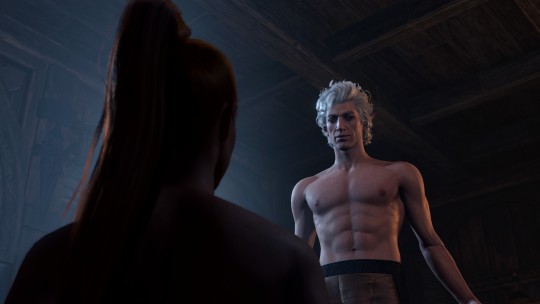
I have always perceived the act of kneeling in the scene where Tav undergoes the transformation into a spawn not merely as an act of submission, but as a kind of oath-taking ceremony. In D&D lore, vampires possess a lawful evil alignment, which is inseparable from strict principles of hierarchy. Astarion calls Tav his consort, emphasizing not only his power and status but also Tav's crucial role in his plans. This also symbolizes their union within the framework of vampiric hierarchy and the new life that will begin after Tav's transformation.
Consort is a title traditionally used to refer to the spouse of a monarch. In the context of a royal family, a consort does not hold the rights of a ruler but serves as an important figure in public and state affairs.
It is particularly noteworthy that it is right after the night of the turning that Astarion first calls Tav his consort, which I personally cannot see as mere coincidence unless he intentionally imbued the event with ritualistic meaning. Such wording is undoubtedly steeped in an aura of regal solemnity, which is especially remarkable for Astarion, given his yearning for grandeur and liberation from his former subordinate position.
When Tav knelt before Astarion, I was reminded of the painting «The Coronation of Napoleon» by the French artist Jacques-Louis David. The painting depicts the moment when Napoleon Bonaparte crowns his wife Josephine during the ceremony held in 1804 at Notre-Dame de Paris. Napoleon stands on an elevated platform in his imperial attire, including a luxurious cloak trimmed with ermine, as he places the crown on Josephine's head himself.
Meanwhile, in the developer's note to the animation tag for this scene in the game, it says: «Tav kneels before Astarion. Astarion stands proud before the Player. He is powerful. He is free.»
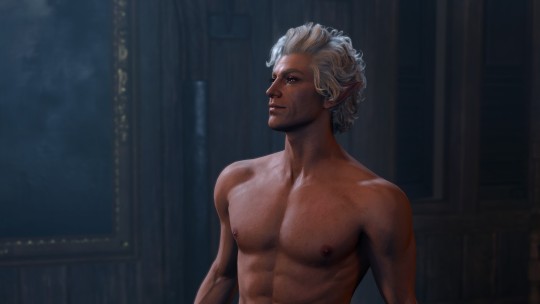
I have no doubt that Astarion was indeed imbuing this moment with a special ritualistic meaning. He wants Tav to acknowledge his supremacy by kneeling before him, as if it were an oath-taking ceremony. This is not just an act of dominance but a kind of ritual with profound cultural and historical undertones.
Undoubtedly, this scene is filled with clear eroticism, which perfectly aligns with Astarion's love for decadence and theatrics. I find this quite amusing, and I'm sure Astarion also enjoyed playing with this subtext, giving the moment a particular sexual tension and sharpness. All of this comes together in a quirky pattern, creating an exceptionally rich scene where cultural and erotic motifs intertwine.
Kneeling is a gesture that carries a variety of meanings depending on the cultural, historical, and social context. It is commonly associated with expressions of respect, submission, devotion, or acknowledgment. In a religious context, kneeling symbolizes reverence before a higher power, humility, or repentance. For example, in Christianity, people kneel before an altar or during prayer. In some religions, the gesture signifies a plea for help, mercy, or forgiveness. In a monarchical context, kneeling has been used as part of rituals such as knighting ceremonies or being admitted into the circle of royal privileges. In the feudal context of the Middle Ages, vassals knelt before their liege lord as a symbol of loyalty and submission. This act was often accompanied by kissing the hand or a symbol of authority (such as a sword or crown). In a romantic context, kneeling is a gesture symbolizing a marriage proposal, as well as an expression of respect, admiration, and love.
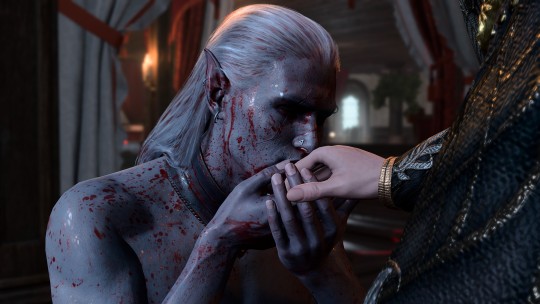
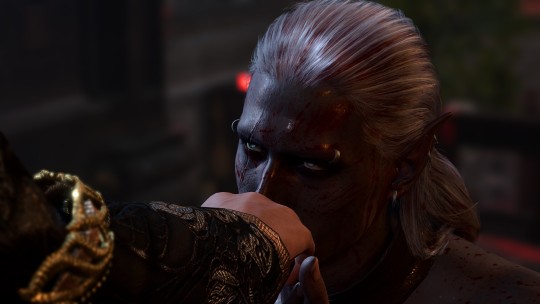
For myself, I highlight the following:
Acknowledgment of sovereignty — kneeling before a monarch symbolizes submission to the authority of the crown and recognition of its legitimacy.
Acceptance into the circle of royal privileges — in this context, the act can be interpreted as a ritual of initiation, where kneeling marks entry into an exclusive circle, granting access to the advantages and status associated with monarchy.
Astarion perceives himself and Tav as something superior to all other beings, stemming from the fact that Tav becomes a vampire. He believes that the transformation of Tav into a vampire grants them the opportunity to become "something more," elevating them to a new level. This transformation not only makes Tav a vampire but also symbolizes their entry into a special, elite category of beings who possess power and authority beyond the reach of ordinary mortals or other creatures. For Astarion, as a vampire, this means that Tav can now share in his greatness.
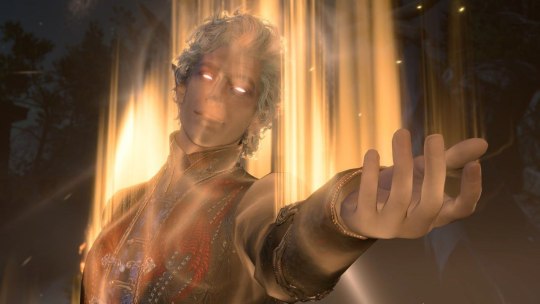
Astarion: You are stronger now. Better. You will thank me one day, I am sure. Astarion: You will be stronger, swifter, sharper, but you won't be different. You were already perfect before. It's hard to improve.
An expression of respect and devotion — such a gesture underscores reverence for the monarch as a divine or political symbol.
Kneeling as an act of humiliation:
In Astarion's thoughts, one can discern that he views Tav’s decision to stay with him and become his spawn as something indicative of degradation, perhaps even moral decline.
When Tav agrees to become Astarion’s spawn, it can be interpreted as a conscious act of self-sacrifice, where they relinquish equality in the relationship and willingly submit to him. This step symbolizes the rejection of personal autonomy and the acceptance of absolute dependence. Tav entrusts their life entirely into his hands. Astarion: You have given me everything. Thank you.
Astarion likely perceives such a decision as a form of "degradation," believing that a normal person, from his perspective, would not make such a choice. He tries to understand why Tav would do this and concludes that Tav derives a certain satisfaction from such a dynamic, perhaps even having an inclination toward it. Narrator: But perhaps you wish to degrade yourself. And he knows it.
This explains his surprise when Tav, contrary to his expectations, asks for tenderness. It’s simply not what he anticipates. His reaction reveals confusion and forces him to reassess Tav’s motives, as such a request goes beyond the scenario he had envisioned.
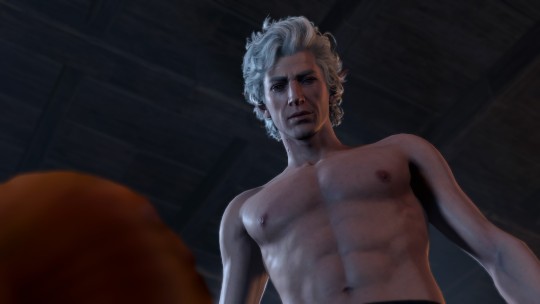
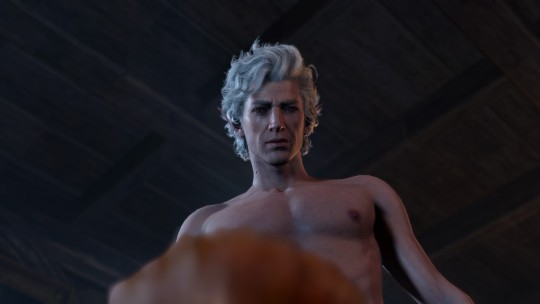
Astarion: So, tell me what you desire. What can I do for my dearest pet? Player: I want you. I want your body. Astarion: You've earned it. But don't you want more - don't you want eternity? One more bite is all it would take. As for Welch's remark that Astarion "won’t respect you," this narrative only applies to the phrase "I want your body," which itself is not required in the game. This line adds an interpretative layer but is not central to all the possible interactions between Tav and Ascended Astarion.
Baudelaire Welch: He's literally looking down on you because you are someone in that situation who believes you deserve sex as a reward. He will give it to you, but he won't respect you.
In essence, the entire narrative about the sexualization parallels the scene with Araj in Act 2, where the player asks for sex as a reward for defending Astarion before Araj or helping with Yurgir's murder. And although Welch desperately tried to impose this motif in the Ascended route, limiting roleplay, it is not the only one, and far from the most obvious. There are other reasons to help Astarion with the ritual, and even he is aware of them:
Astarion: Of course I understand love. All too well. The gravest crimes committed in this world are committed for love. A hunger crueller than bloodlust.
Many also overlook that Tav's consent to become his spawn is seen by Astarion as an expression of exceptional trust and devotion. His gratitude the following morning confirms this: he sincerely expresses appreciation for the trust shown in the very first phrase he addresses to Tav. Astarion: You are so beautiful... And you will be beautiful forever. Thank you for trusting me. Moreover, trust becomes the leitmotif of his dialogues afterwards, especially when their relationship with Tav is questioned or criticized by their companions. Each time, he emphasizes that their relationship is built on this foundation:
Karlach: You know, Astarion, I'm not sure I can trust you anymore. You're… different. A bit scary, to be honest. Astarion: I have one person who trusts me completely. That's enough for me. Lae'zel: You have shared your new power with your lover, Astarion. I'm surprised - I expected you to turn your back once you got what you wanted. Astarion: Quite the opposite - I need someone I can trust. And now I know they'll never betray me.
Unfortunately, in the kiss scenes of Patch 6, the original context was lost, and the focus shifted to themes of fear and humiliation that were not present in the original dynamic with Ascended Astarion. Considering that the kiss scenes were based on the scene of Tav’s transformation into a spawn, which is almost obvious, their emotional tone was distorted. For example, initially, Tav knelt entirely of their own free will, which emphasized the intentional and voluntary nature of their decision. In the kiss scenes, on the contrary, Tav is shown kneeling out of fear, the source of which remains unclear. Throughout the game, it is never shown what consequences Tav could fear for refusing to do so. In the transformation scene, Tav can refuse and not face any frightening consequences.
It also seems illogical when Tav is frightened when Astarion grabs them by the throat. This contradicts the transformation scene, where Tav themself initiated it, asking Astarion to hurt them and even tilting their head back, exposing their neck.
Astarion: It will only hurt a bit, the pleasure will be far greater than the pain. Player: Oh, come on. Let it hurt.
In the kiss scenes, however, this dynamic, based on mutual consent, was changed to an act of violence. This further exacerbates the inconsistency, especially considering that in the original script of this scene, it was noted that both Tav and Astarion derive pleasure from what is happening.

In dialogues, Ascended Astarion also demonstrated a willingness to be tender with Tav when Tav expressed it through words. He was not solely focused on rough dominance, as was attempted to be imposed in Patch 6. This change is likely an attempt by Larian to please the audience who, without going through the Ascended route and without understanding its nuances, actively promotes the narrative of the collective majority about the cycle of abuse.
Yes, the facial expressions in the kiss animations were changed due to fan requests for the Ascended route, but the aftertaste and consequences of these changes remain.
Some players still argue that facial expressions in role-playing games should be imposed "for the sake of the great narrative," while others use game conventions, such as cyclicality of animations, to demand the return of scared expressions. However, bringing back this dynamic would undermine the story and the character that fans of Ascended Astarion have known and loved for six months after the game's release.
In my opinion, to expand the role-playing experience, it would be much more useful not to return the scared expressions as an option, but to add the possibility for the lord to use more standard kisses, similar to those in Patch 5.
It is unclear why many are convinced that the vampire lord is incapable of tender kisses with Tav when his love scene demonstrated just this tenderness, and the moment with the kiss on the hand is one of the most refined and delicate romantic episodes. In particular, the kiss on the hand, which happens after the "be gentle" option is chosen, not only emphasizes Astarion's attention to Tav's desires and his willingness to listen, but also contradicts the notion of his exclusively dominant and cold nature.

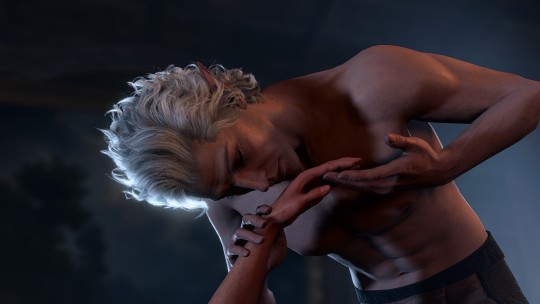
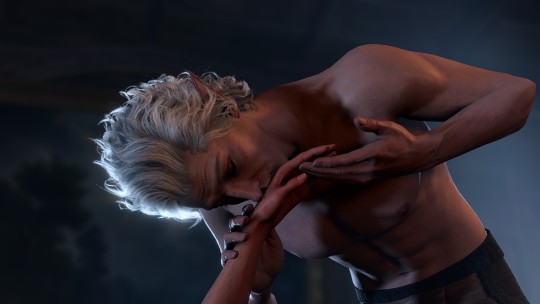
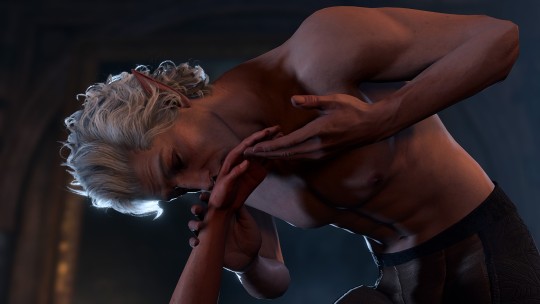
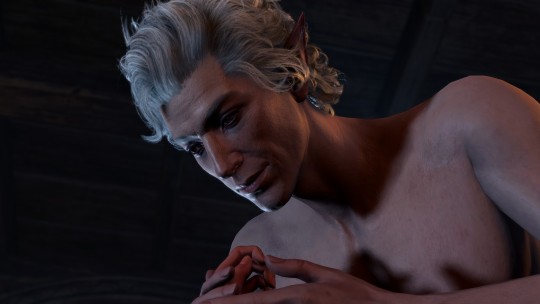
If Astarion is capable of expressing such tenderness in intimacy, why is it excluded that the same softness could be maintained in his kisses?
The kiss in Patch 6 would only make sense if, upon choosing the "be gentle… if you can" option, Astarion ignored Tav's request, and his actions were no different from those in the "let it hurt" option.
I would also like to draw attention to the sharp contrast in Tav's facial expressions in the bite scenes, written by different writers. In Act 1, when Astarion was written only by Stephen Rooney, Tav's facial expression shows ecstasy, and this same expression is repeated in the lord's love scene, which, according to Welch, they did not write.
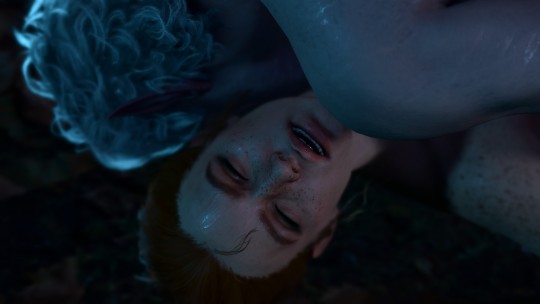
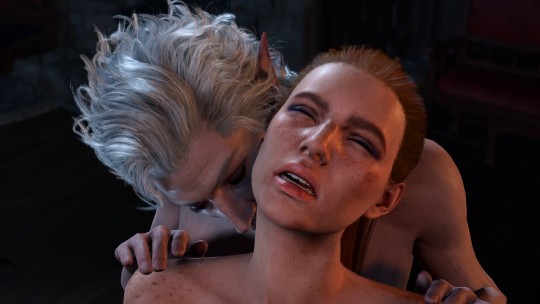

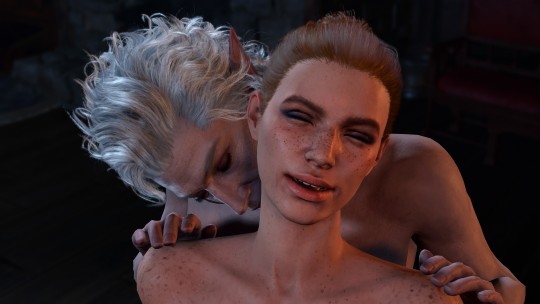
However, in the transformation scene, which, as Welch confirms, was written with their involvement, Tav's facial expression is noticeably different.


It’s not fear, like in the kisses from Patch 6, but the expression conveys a "problematic/kinky" mood — a term that Welch themselves used to describe this scene. This looks particularly strange in the dialogue where Tav explicitly asks to be hurt:
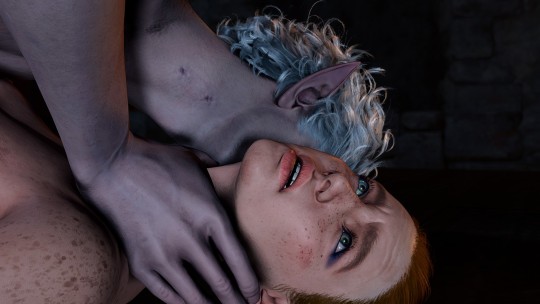
Astarion: Shall we have one last night together before you join me in immortality? One for the road, so to speak. Player: We shall not. I just need you to bite me. Astarion: Impatient are we? Well who am I to deny you?
This suggests that Welch’s views on "kinks" are at least debatable, and this influences how they are portrayed in the game. For example, Welch sees the transformation into a spawn as an "irreversible sex-pact/kink/form of gratification," but Tav's reaction in this scene is somewhat more uneasy than in previous episodes involving similar actions.
Both scenes are consensual, but they have a different tone simply because one of the writers condemned the player for "kinks," while the other did not.

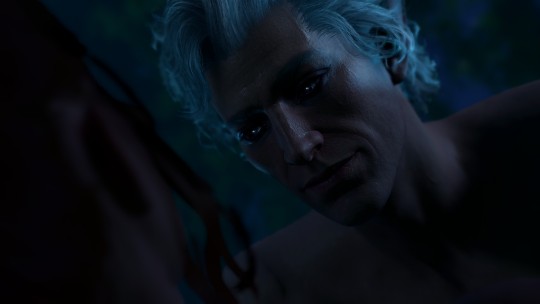
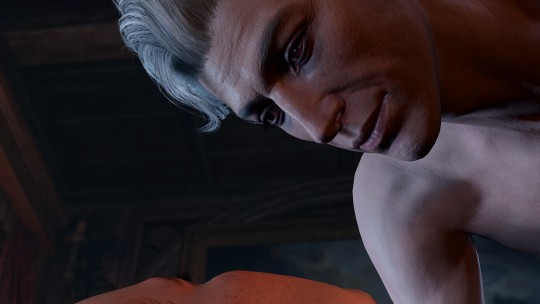
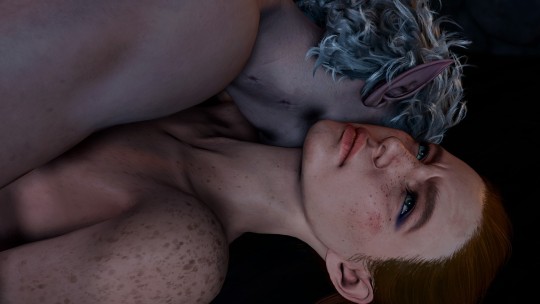
In the cinematic context for the transformation scene, the following was stated: "You are naked and vulnerable before him." This feeling, it seems to me, is what the animators tried to convey and embody, capturing the intimacy of the moment. However, with the release of Patch 6, this message became distorted, turning into something entirely different — crude and devoid of the original subtle undertones.
In this context, I believe that the kisses from Patch 7 appear much more consistent compared to the facial expressions in Patch 6.
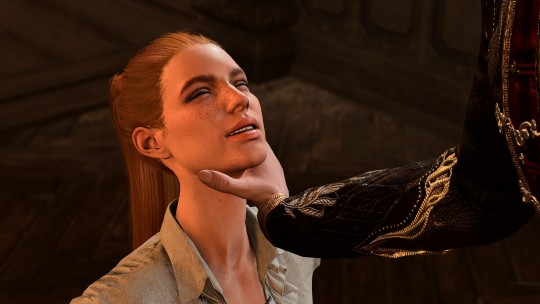
Especially when considering the following points:
Astarion grabs Tav by the neck solely at the player's initiative, and the dialogue clearly implies that Tav wants this.
Tav has previously reacted with obvious pleasure to similar actions by Astarion in other scenes.
I genuinely do not understand why Baudelaire Welch's contribution should be considered more significant, given that they joined the project during the later stages of the game's development. Especially when you consider that the character was originally created by another writer, who laid the foundation for his personality, story, and key traits. Prioritizing late additions that distort the original concept seems unfair and disrespectful to Astarion's creator and his vision.
At this point, I would like there to be an option in the game to kiss Astarion's hand. A hand kiss is also a symbolic gesture that conveys respect, devotion, submission, and acknowledgment of power or authority. I find this incredibly romantic, and I truly miss it. It would further emphasize the symbolism of this route.
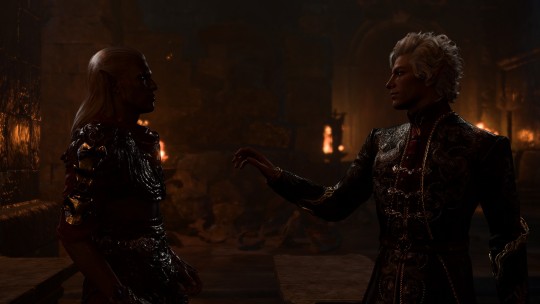
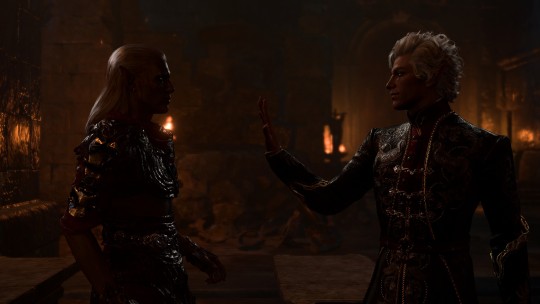
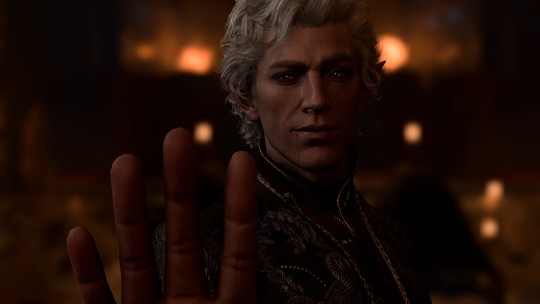
#baldur's gate 3#baldurs gate 3#bg3#astarion#astarion ancunin#bg3 astarion#ascended astarion#astarion bg3#astarion romance#astarion x tav#astarion x durge#astarion analysis
304 notes
·
View notes
Text

2,000 Bronze Statue Fragments Found in Turkey Ancient Scrap Yard
Archaeologists in Izmir, Turkey have made an extraordinary discovery in the ancient city of Metropolis: Approximately 2,000 bronze statue fragments have been found in a section believed to have served as an “ancient scrap yard”.
The excavations are being carried out within the scope of the ‘Heritage to the Future Project’ of the Ministry of Culture and Tourism, under the direction of Prof. Serdar Aybek, Professor of Archaeology at Dokuz Eylül University, and in cooperation with the Sabancı Foundation.
Archaeologists have discovered evidence of many civilizations, from the earliest settlements in the Late Neolithic Age to the Classical Age, from the Hellenistic Age to the Roman, Byzantine, and Ottoman periods, in the ancient city of Metropolis, also called the “City of Mother Goddess,” where excavations have been going on since 1990.





In the ancient city, where many monumental structures were unearthed, these fragments, uncovered in an area believed to have served as an “ancient scrap yard,” offer a unique glimpse into the cultural and religious shifts of the region during the Late Antiquity period.
Professor Serdar Aybek stated that the bronze statue fragments were found in a corner of a space referred to as an “ancient scrap yard,” where they had been broken apart for melting and stored in bulk.
Aybek explained that the findings include statue pieces from the Hellenistic period and figures from the Roman era, describing them as “extraordinary discoveries, even for our field of work. We have uncovered approximately 2,000 bronze statue fragments,” he said.
He highlighted the significance of the bronze statues being broken into pieces, noting, “The collection and recycling of statues in the Late Antiquity provide concrete evidence in Metropolis. Among the findings are parts such as heads, eyes, fingers, and sandals.”



Drawing attention to the dismantling of these statues, Aybek said, “In the Late Antiquity, as mythological beliefs were abandoned in favor of monotheistic religions and Christianity became dominant in the region, bronze statues from mythological and earlier eras were dismantled. Although we do not yet have archaeological evidence to confirm this claim, we can suggest that a significant portion of them was repurposed for minting coins. During that period, rather than producing new materials, bronze groups, mainly consisting of outdated or damaged statues, were broken apart by the ancient scrap yard worker and prepared for melting.”
The fragments might be from the statues built to honor the benefactors listed in the “Metropolitan Apollonios” inscription, according to Aybek, who also underlined the historical significance of bronze statues in antiquity.
What makes this discovery even more remarkable is the evidence of recycling practices that date back over a millennium.
In addition to the fragmented statues, archaeologists discovered square and rectangular bronze plates that were probably used for statue casting and repair. This implies that, at its height, Metropolis might have served as a center for the creation or repair of bronze statues.
By Leman Altuntaş.



#2000 Bronze Statue Fragments Found in Turkey Ancient Scrap Yard#ancient city of Metropolis#ancient scrap yard#bronze#bronze statue#bronze sculpture#ancient sculpture#ancient artifacts#archeology#archeolgst#history#history news#ancient history#ancient culture#ancient civilizations#late antiquity period#ancient art
230 notes
·
View notes
Text
Canada, Truth & Reconciliation, & Indigenous Games
Hello friends,
Today (September 30th) is the National Day of Truth & Reconciliation in Canada. It is a very recent holiday in this country, and it’s also very important to me. I want to spend some time today telling you about it, and then (since this is a ttrpg blog) directing you to some indigenous storytellers and designers that deserve a spotlight for various reasons.
I am not Indigenous. This information is a collection of knowledge that I have gained through university coursework, personal research I've undertaken, and relationships I've cultivated with indigenous friends who have taken pains to educate me and highlight how these issues have personally affected them. I am aware that the summary I'm providing is incomplete, and there may be elements that I don't fully understand the implications of.
If you are Indigenous, please keep in mind that this post may recall some painful and personal moments of history for you. Proceed with caution. The shout-outs to indigenous creators can be found after the heading “The Storytellers.”
The Truth.
Canada has been engaged in a cultural genocide of its indigenous peoples since European settlers started the colonization of the country. This genocide had many avenues, including the creation of the Indian Act, the relocation of many Indigenous peoples to restricted Reserves, and a disturbing trend of missing and murdered Indigenous women. For the purposes of today however, I’m going to stick to just talking about Residential Schools, and the impact they had on Indigenous families and their children.
Residential schools were designed to “kill the Indian” and “save the child”, in the words of John A Macdonald, the prime minister who authorized their creation. They were designed to sever Indigenous children from their culture and raise them in a Christian, colonial context. These residential schools were harsh, forbidding Indigenous children to speak their mother tongues, cutting their hair, and forcing them to learn skills considered “useful”, in the language of the colonizer, away from their parents. The schools were also hotbeds of abuse. Alarming numbers of children fell ill and died at these schools - the death toll to this day is unknown. From April 1, 1920 to some time in the 1990’s, residential school attendance was mandatory for Indigenous children from the ages of 7 to 16.
The Sixties’ Scoop is a reference to a mass kidnapping of Indigenous children in the 1950’s and 60’s, who were forcibly removed from their homes and “adopted” into non-Indigenous families. While the last residential school in Canada closed in 1997, Indigenous children still make up over 50% of all children in private foster care, despite only accounting for just over 7% of all children under age 15 in Canada.
The Reconciliation.
Reconciliation is a goal prompted by Indigenous groups and elders. It is a choice that promotes "balance and harmony," a way of life that encourages coexistence, according to the words of one residential school survivor, Hereditary Chief, Dr. Robert Joseph.
In 2007, The Indian Residential Schools Settlement came into effect, offering compensation to survivors of many residential schools.
In 2008, the Truth and Reconciliation Commission of Canada was officially launched, intended to be a guide for the Canadian government to help establish lasting reconciliation. This commission was a way to formalize a method of collecting data, and it also had the responsibility of developing a list of recommendations for the country of Canada to follow, in the goal of pursuing a relationship between the Indigenous peoples of Canada and the government of Canada.
In 2007, Cindy Blackstock, a First Nations (Gitxsan) activist launched a court case against the Canadian government, for under-funding social services provided to children living on First Nations reservations. This was in regards to Jordan’s Principle, a child-first Canadian policy that is meant to ensure that First Nations children have equal access to all government funded public services as other Canadian children. The Truth and Reconciliation Commission made the respect of Jordan’s Principle one of its 94 Calls to Action for the Canadian government.
The Canadian Human Rights Tribunal became involved in 2016, when they found more alleged breaches of the Canadian Human Rights Act in regards to Jordan’s Principle. As of September this year, the Federal Government is still attempting to dismiss human rights complaints regarding the use (or, in fact, neglect) of Jordan’s Principle.
Canada’s history of residential schools and use of the foster care system has grievously wounded Indigenous families and children. The disruption of family life and the forcible removal of children from their culture has created legacies of loneliness, pain, and suicide. Indigenous people today can trace their own familial wounds to the legacy of residential schools and the lack of resources provided to them from the government. The National Day of Truth and Reconciliation is a day to remember this legacy and provide a space for education, but it isn’t enough.
You can learn more about this day and the history behind it by visiting the National Centre for Truth and Reconciliation Website.
You can also watch this 18-minute Youtube video about Residential Schools, or We Can’t Make the Same Mistake Twice, a free 2 & 1/2 hour documentary about Blackstock's continuous fight regarding caring for children using Jordan’s Principle.
I also recommend 21 Things You May Not Know About The Indian Act, by Mary-Ellen Kelm and Keith D. Smith, which breaks down some of the key elements of the Indian Act for everyday person.
So, how do we connect this to ttrpgs?
When it comes to the milestones that have been achieved in Canadian history, those milestones have been made because we listened to Indigenous voices. The recommendations made by the Truth and Reconciliation Commission that have been followed are having real and positive effects for Indigenous peoples in Canada. Listening to the stories of Residential School survivors has been integral to the processes recommended and undertaken by the Canadian government.
We need Indigenous stories. We need Indigenous storytellers.
The Storytellers
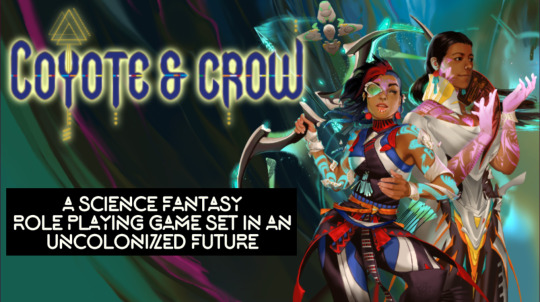


Coyote & Crow.
Coyote & Crow Games is a tabletop games publisher, primarily focused on the tabletop roleplaying game, Coyote & Crow. This is a world and game whose design team is fully Indigenous, from various First Nations people groups across North America. Coyote & Crow is a futuristic game about a land untouched by colonization, a land changed by a series of climate events that have changed the geographical and social landscape. It involves supernatural powers, a completely unique form of civil organization, and a unique d12 dice pool system
In a recent update, Connor Alexander, as the face of Coyote & Crow, announced some business decisions that include a creation of a consultant branch of the company, to provide professional consultation services for other creative endeavours that are looking to include Indigenous Representation in games.
What I love most about Coyote and Crow is that it’s a world where Indigenous creators have been given full reign over the ways they are represented in the fiction, and it provides a unique social and political imagining of society that pulls from many First Nations cultures. It’s refreshing, it’s exciting, and it provides a lot of guidance for non-Indigenous players so that they can engage with the world in a way that’s respectful.
Wendigo Workshop
This is a small team based in Quebec, Canada. I’m not entirely sure whether the team is fully Indigenous, but there are Indigenous creators as part of the team.
Currently the Workshop is working on a number of different games, including… Anomaly Hunters; a monster hunting ttrpg built on the Breathless SRD. Arkelon Chronicles; a science-fantasy ttrpg surrounding the discovery of an Alien ruin. Last Hope; a Caltrop Core game about magical girls fighting to protect the world while balancing their student lives.
Bramble Wolf Games
@sahonithereadwolf is an Indigenous creator based in Appalachia looking to make games that mean something. I found out about him through his game Exceptionals, a game about community, activism and kinetic eye beams. It’s inspired heavily by X-Men, but instead of telling superhero stories, it’s more about the fostering of a community outside of the systems created and enforced by colonial governments.
Sahoni is also currently working on a game called Protect the Sacred, a game inspired by Indiana Jones, but focused on the protection and preservation of monsters and artifacts in the interests of the cultures that have been stolen from by colonial powers. The game is about your relationship to your culture, and resistance to fascism - and you can get sneak peeks to this game through Sahoni’s Patreon.
Both Protect the Sacred and Exceptionals involve character creation that requires players to answer questions about who they are, what they do, and how they affect the community around them. They both recognize the community around you as integral to your success, and I think that this point of view is such an important concept to consider when using games as an art form that can expand your social imagination.
Also...
There is a consultancy service in Alberta, Canada called Pe Matawe Consulting, which is not focused specifically on ttrpgs, but does provide consulting for various creative endeavours. They provide consulting services as well as workshops, with the goal of providing a broader understanding of Indigenous culture and folklore.
164 notes
·
View notes
Note
Hi Crow,
Apologies if this has been asked before but I’m trying to get to the bottom of what people describe as ‘biblically accurate angels’ and I’m getting conflicting results and I thought why not ask someone who definitely knows more on the topic than me. Is the incomprehensible multi-eye wheel creature thing true?
"True" is the problem, because... it is, and it isn't, and it depends, and it's complicated!
I looooove angels, you're right, and I was working on doing a vid on this exact topic because the term 'biblically accurate angel' is a pet peeve of mine. However, no matter the power of my autistic angelic obsession, I wouldn't say I'm a perfect source. I got intimidated outta making that video because I got too anxious of messing it up and losing my angel cred. BUT! I do know some stuff.
What's wrong with "Biblically Accurate Angels?
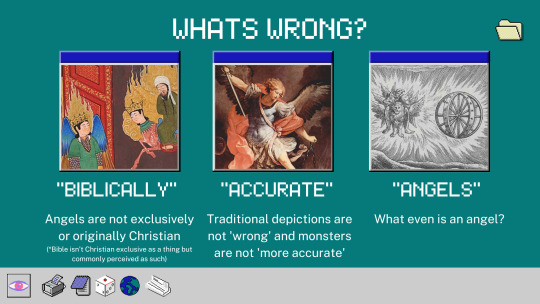
Three things!
1. "Biblically"
Most people I see, when confronted with the word 'Biblically', think of Christianity. The Bible technically refers to a collection of texts shared by a number of Abrahamic religions, but I've a lot of people entirely unaware of that fact. There's often a general lack of recognition around 'biblically accurate angel' posting that angels aren't exclusively or originally Christian concepts. Tumblr is an outlier of a place, remember; I read youtube comments.
2. "Accurate"
This makes me lose it, just a little bit, because the idea 'real angels in the bible actually looked like scary monsters' is both incorrect and kind of a rude thing to say about a holy entity a number of religions believe in.
There are a lot of ideas of angel classification and hierarchy, but you'll usually only see one--- the Christian one. This has nine orders in three spheres, going usually angel, archangel, principality (3rd sphere, most humanoid), powers, virtues, dominions (2nd, basically no lore), thrones/ophainim, cherubim, seraphim (1st, weirdo patrol). The lowest spheres are closest to humanity, the highest are closer to the divine.
(it's worth noting there's a big difference between 'what is exactly in the canon holy text' versus 'writings/visions/ideas from scholars later'. There's differing opinions everywhere and also different sects.) Little is universal.
Speaking of, religions! Heard of them? Angel hierarchy as it's commonly see is very specifically a Christian angle! There's a number of different Jewish angelic hierarchies which include different types or interpretations of angels. There's usually 10 ranks instead of 9 too.
I know the least about angels in Islam, but they don't have a strict angel hierarchy either, though some angels are more important than others.
As for angel physical descriptions, it varies. They can take human form, but they're spirits doing that for our convenience. Some of them are doing weird stuff, but most of the time an angel is some essence of light and fire taking a lesser defined shape for our convenience.
Some of the main ideas of a 'biblically accurate angel' come from one of my fav bits of the bible, the chariot in Ezekiel.
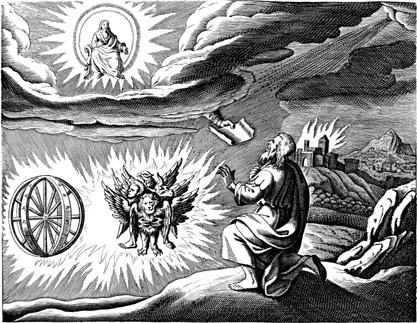
If you've not read the fun weird bits of the bible before, let me introduce you!!
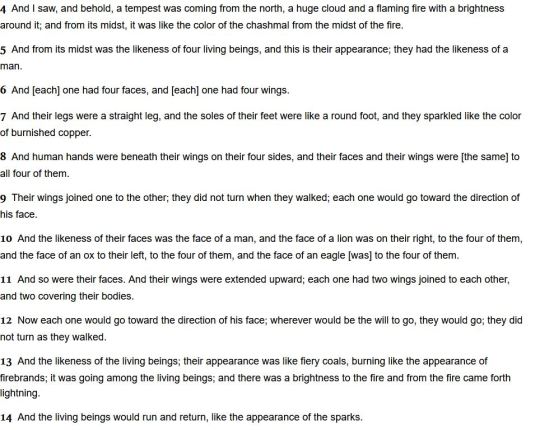
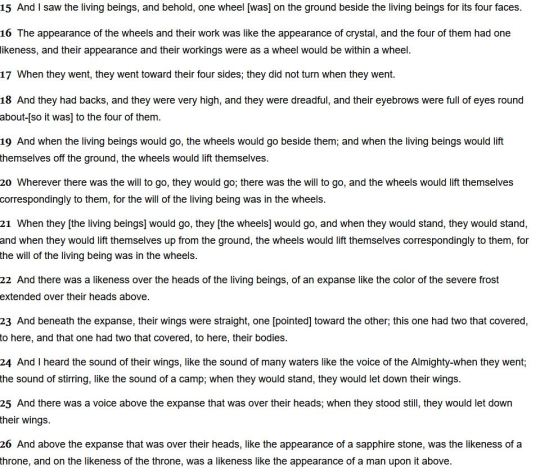
These are the Living Creatures which are considered Cherubim in Christianity. The wheels are the Ophanim, who are also Thrones. The whole thing sounds like a very intricate chariot rather than a bunch of angels, but hey, it says right there they're 'living beings'
3. "Angels"
What is an angel anyway?
Well, there's an answer, but as I think I've highlighted there's a number of different, varying ideas of them which are all equally valid! This can include, of course, the artistic choice of making them monsters ( I love doing this ), but it's incorrect to assert such a design is 'more or truly accurate'.
Angels are messengers. The word for angel originally was Messenger, and the role of angels is generally to serve as a conduit and messenger of divine will. They can be teachers or healers. They often are more extensions of the holy rather than truly independent spirits, good because they are divine rather than the choice of free will. (but like everything I'm saying it depends bc religions and opinions are not unified monoliths).
Not all angels are messengers. Even without a strict hierarchy, there's a common idea of specific angels for specific jobs. The idea of Archangels is also common, though which are and how many differs wildly, as does their function.
Angels are divine beings. Humans don't become them. There also are some sects that believe this, like the Latter Day Saints, but generally the divide between human and angel is very clear. Humans are generally above angels, because we're beloved new ocs.
angels are cool. I really like them
---
anyway, this is a very approximate ramble for you on the subject. I think I could have gone on in much more detail and I decided not to. Especially as I note I don't have that kind of 'learn and memorize everything about your special interest' kind of autism, just 'a lot more than normal over many years'. Angels are a really complicated subject because religion is, and it all differs. But I do dislike Biblically Accurate Angel because I think it's really misled people who come across it casually. Yes, there's weird angel stuff, but it's pretty rare (especially in common canon), and it isn't 'the secret creepypasta truth'.
#angels#sometimes theres asks#god I think this is a normal anxiety/autism thing but I am always so paranoid#of posting something like this and getting like 800 corrections and getting a Bad Grade In Angels.
92 notes
·
View notes
Text
AO3 reading year in review 📚
Tagged by @teafig! Here’s a fraction of the fics I enjoyed this year! 💖

JANUARY: Of Wishes and Feathers by @trishacollins {Miraculous 🦚}
Little Felix spends an afternoon being entertained by his aunt.
Trisha wrote this for me because I am the most spoiled girl in the world! 💜 We need more Felix and Emilie in the world urgently. Someone make it your 2025 resolution. I demand it
FEBRUARY: my wings and my eyes by @bittersweetresilience {Honkai: Star Rail 🚂}
Jing Yuan is tired, but he has been tired for a long time now.
Sunny gets February for no reason other than it is Official Shipping Month and its prose single-handedly got me into Renjing. This fic in particular is so loving and tender… 🥺 There is nothing Sunny cannot write and these two idiots have helped prove it time and time again!
MARCH: I miss you more than anything by @sillyangstfic {Miraculous 🦚}
Felix reaches out to Adrien a few months after his mother's death to see if he would like to come visit. Adrien thinks that this is a great idea! Gabriel, not so much.
This was not yet published in March but WHO CARES THE VIBES FIT. Felix cares so much and the Adrien/Dandelion angst is, as the youth say, fire 🔥
APRIL: thirteen by @anna-scribbles {Miraculous 🦚}
The house was never something that belonged to him, and it still isn’t, no matter how many documents boast his name in bold print. Adrien has always belonged to it, though, like a dog tethered to a chain, like a ghost to its unfinished business.
//
The end of the world began on the day Adrien Agreste turned thirteen years old.
What can I say about thirteen that hasn’t already been said? I picked it for April because reasons, but it’s been a highlight of my entire winter and spring. The Adrien Fic Ever 🌼
MAY: love thorns all over this rose by @thevioletthread {Miraculous 🦚}
there's a boy knocking on her window. she lets him in.
[Doodles a tiny heart on your window]
[Kisses you in front of the sunrise]
[Gets down on one knee]
Alexandria, will you raise a hamster with me? 💜🦚❤️🐉
JUNE: Of Broken Bones and Promises by @bright-thehawksflight {Cyrano de Bergerac 🪶}
Christian had a leg amputated, and the two loves of his life manage to simultaneously save his life, plan for the tough times to come, and pine all over the Arras battlefield.
Lisa is the reference when it comes to Cyrano and Greek mythology fanfics. I think about the amputation-hug scene three times per week 🥺
JULY: Candle In The Wind by @phieillydinyia {Miraculous 🦚}
Someone was screaming. A horrific, guttural sound that infected the entire night with sorrow. He wondered if it was the ghosts of the people he'd just killed. He wondered if they'd come back to haunt him, to follow his every waking move, to never let him forget the way he'd demolished them into dust.c
The sound pounded through his head, threatening to burst open his eardrums, determined to push him to a breaking point. Collapsing to his knees, Chat Noir had to pause to draw in a deep breath.
It was only then that he realized the person screaming was him.
The highlight of my summer! A role reversal AU of the movie that includes the songs. How cool is that. (The answer is very cool. Mwah 💖)
AUGUST: If I hold you too close by @bbutterflies {Miraculous 🦚}
Paris didn’t come to a screeching halt for akumas anymore. They were so commonplace, so frequent, no one stopped their lives unless they were in danger. They trusted the heroes to fix everything if something did go wrong, save them if they got hurt. Adrien was still fighting the urge to find Plagg and go running into battle.
Plagg wasn’t here, though.
ADRINO ANGST MGRRRGRRRRR
SEPTEMBER: Luminous strike by @faiirygrahamdevanily {Miraculous 🦚}
Orders controlled the younger twin
Like a bird with a clipped wing
Silver metal out of his hand
The peacock at the monster's command
MY BIRTHDAY GIFT!!!! THAT CAME WITH ITS OWN MOODBOARD!!!! HELL YEAH!!!! 🎂💜🎉
Everyone should check Clara’s works out!!! The Sentikids are great for exploring themes of otherness and rarer forms of fanworks, and she does it extremely well! ❤️💜💚
OCTOBER: the monster who loves you by @purplecatghostposts {Miraculous 🦚}
Mum nods, clapping her hands together. “Your brother is finally feeling better and is coming home today! Isn’t that so exciting?”
Félix pauses mid-bite, processing her words. Mum waits expectantly, as if expecting him to jump for joy, or his equivalent of it.
But… Félix doesn’t have a brother.
(Or Félix’s brother is a monster, but only in the most literal sense. Félix’s father is a monster despite being very, very human. He learns to navigate the world through these two truths.)
SOAP SOAP SOAP SOAP I am eating you. I am eating you forever. You spontaneously appeared in the tags one day and literally haven’t stopped blessing us since but THIS FIC IN PARTICULAR. OH GOSH. OH WOW. THIS ONE IS MY ROMAN EMPIRE. You know how much I love Adrien being cast as the monster (rawr rawr rawr 🦖)
NOVEMBER: Emmy Altava and the Situationship from Hell by @drowsybadger {Professor Layton 🎩}
Or: Clive, Janice and Their Mutual Ex. Or: Emmy Altava and the Great Year that started off really, really, awful. Or: How To Overcome Your Past Mistakes
Basically, 22K words of people fixing their past mistakes and being lovingly awful to each other. Also, Clive is single-handedly responsible for London rent prices actually being affordable for the next half-century in this universe.
Drowsy infected me with the Clivejan QPR bug… My life has never been the same since…
DECEMBER: Me and You, We're Roses of Blue by @adastra-rising {Miraculous 🦚}
For centuries, the blue rose has represented mystery, royalty, and that which is unobtainable.
Why?
Because the blue rose is artificial. Unnatural. So close to being real, but not quite. The unfortunate, disappointing result of humanity daring to challenge the natural order.
And for some reason, Felix Graham De Vanily can't stop thinking about it.
Meanwhile Kagami Tsurugi, despite everything, thinks they are wonderful.
And Adrien Agreste, who prefers his roses red, is just here for a good time.
(A story in which Felix reflects on his childhood, his relationships, and the nature of what's artificial and what's real.)
(Alternatively, a story where the ideal date is destroying a dead man's property in the name of art, and two cousins who are actually brothers' bond over one truly terrible joke.)
Because excellent characterisation and flower imagery are always a gift! 🌹
SPECIAL MENTIONS
Aka works that didn’t quite fit but that I really wanted to feature:
Icarus by @dragongutsixofficial {Dumas Cinematic Universe ⚔️}
The year is 1630. The Cardinal of Richelieu won. Mme de Fargis is banned and has to leave the Court.
She has a few people to say her goodbyes to.
DRAGON STARTED WRITING AGAIN THIS YEAR AND I COULDN’T BE PROUDER. They have a real talent for emulating Dumas’ style while making the story uniquely theirs! 💖
time marches back by @asukiess {Miraculous 🦚}
The Loveybug AU was one of the highlights of 2023-2024, and this fic? This fic. It’s great, man. Definitely won’t break your heart or anything.
Everything in The Félix Zine! I have a particularly soft spot for @mostmagical’s Bridges and @nemaliwrites’ A Graphite Heart, but everyone slayed so incredibly hard! Please also contemplate our amazing artists’ pieces! 💜🦚
@beezonia’s Miraculous Mons AU. Bee, you know it, I’m the target audience for this universe. I love your ficlets, your team line-ups, your designs, everything! 💙🩵🧡
cringe origional works collection by @isdisorigionalenoughforyou
The kind of poetry that will haunt you. Discovered by accident after reading their Aroace Analysis of Jayvik, which you should also check out! 🦋
And my beloved AO3 collections (recs + my own works):
Felix | Adrien | Kagami | Senticousins | Feligami | Clive | Literature and mythology
Tagging… anyone who wants to do this, because I forgot who was and wasn’t tagged by my fellow writer friends. Go wild.
Happy 2025, everyone! May it be kind and filled with excellent stories for us to share! 💚💜❤️
43 notes
·
View notes
Text
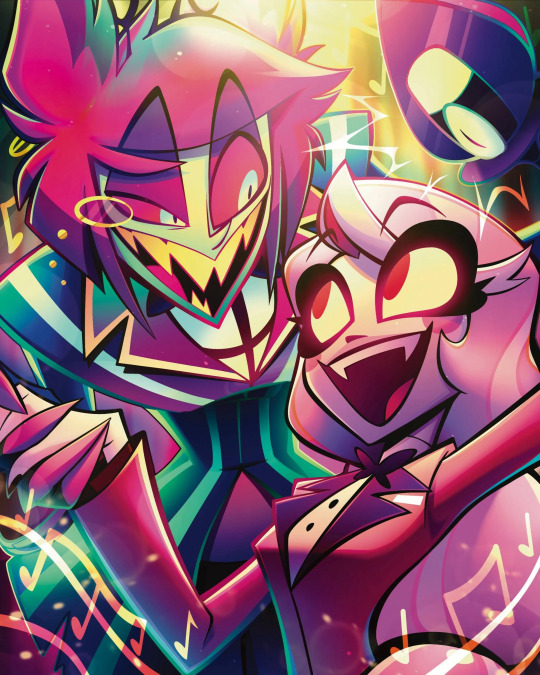
I don't see this topic discussed very often, but Alastor is such a great foil and antagonist for Charlie, and a catalyst for her character arc.
In any narrative, a foil is a character who contrasts with another character, typically, a character who contrasts with the protagonist, in order to better highlight or differentiate certain qualities of the protagonist. A foil to the protagonist may also be the antagonist of the plot. [...] A protagonist is the story's main character, whose actions help propel the plot forward. An antagonist, while often a secondary character, is pivotal in creating compelling narratives by introducing challenges and conflicts for the protagonist to overcome. These two characters are seen as opposing forces serve as the driving forces behind the plot; with the protagonist representing the hero or central figure of the story, and the antagonist acting as the main adversary. Together, they create a dynamic, and often complex, relationship that draws readers and audiences into the narrative, leaving them invested in the outcome of the conflict between the two. [...] The protagonist's journey often involves some sort of personal growth or transformation, as they learn important lessons or face significant challenges [from the antagonist] that shape their character.
When we look at Alastor and Charlie as separate characters, they couldn't be more opposite from one another. Whereas Charlie is sincere, genuinely friendly, innocent, naïve, trusting, believes that there is good in everyone, finds hope in redemption, and is one of the most pure-hearted souls in Hell, Alastor is steeped in sin. He is a remorseless narcissist and sociopath who enjoys torturing and killing others; in life, he was a serial killer who targeted the "scum of the Earth" - abusers, rapists, murderers, etc. - for amusement, entertainment, and to enact his brand of "divine justice" on the guilty.
He is someone who is unapologetic, or even gleeful, about giving others the comeuppance that he believes that they deserve. Alastor thinks that "there is no undoing what is done", and that sinners in Hell - himself included - deserve eternal punishment, whereas Charlie wants sinners to be redeemed, and find eternal happiness, peace, and bliss in Heaven. There two couldn't have more opposing views that clash with one another; and, yet, Alastor and Charlie usually get along quite well, and are well-matched in other personality aspects, such as enjoying music, dancing, and working as business partners.
Alastor's character traits also balance out Charlie's traits well. Whereas Charlie is innocence, Alastor is experience; whereas Charlie is naïve and trusting, Alastor is shrewd, calculating, and mistrusting; and, when Charlie needs assistance in her darkest hour, Alastor appears to help her, serving a role as both her friend (i.e. shared interests) and her antagonist (i.e. having conflicting goals and beliefs), with the latter role being important in Charlie's character development in Season 2 and beyond. Without Alastor, there is no development for Charlie.
The entire purpose of the antagonist in a story is to shape, mold - or "guide", as Alastor puts it - the protagonist (Charlie), and serve as a catalyst for character growth. In Charlie's case, we have a classic case of what the Germans call a blindungsroman, or "a story that focuses on the psychological and moral growth of the protagonist from childhood to adulthood". From a character standpoint, Charlie is still in the "childhood" stage, but Alastor wants to help transition Charlie from "childhood" into "adulthood", and from "innocence" into "experience", in what one writer termed "the crucible of youth".
"The German word 'Bildung' is both a thing and a process, originally referring in a Medieval Christian context to how God actively transforms the passive soul of the believer. If sin deforms the believer, the sinner must passively prepare to receive God's grace, and this passive reception is a kind of molding by God to prepare the sinner's soul for redemption. From the very beginning of the idea of Bildung, the word identifies how people become who they are, and it has always assumed that 'becoming' is never simply an act of the individual will. [...] A universal truth seems constant...reaching maturity is often achieved at great cost, and only after severe heartbreak."
#hazbin hotel#alastor#hazbin alastor#hazbin hotel alastor#charlie magne#charlie morningstar#hazbin charlie#hazbin hotel charlie#charlastor#radiobelle#opposites attract
109 notes
·
View notes
Text
Sudan’s National Museum, once the guardian of an invaluable collection of artefacts spanning thousands of years, has been ravaged by looting and severe destruction at the hands of the paramilitary Rapid Support Forces (RSF) [...]
The destruction is a result of a civil war between the RSF and the Sudanese Armed Forces (SAF), ongoing since April 2023, which has killed tens of thousands of people and displaced millions. [...]
“It [the initial damage assessment report] was horrible, really horrible. I am very sad. We are crying,” Ikhlas Abdel Latif, the director of museums at NCAM and the head of its circulating artefacts unit, tells The Art Newspaper from Cairo. “We already knew that the museum would be damaged and looted, but not in the way we have seen in the report from our colleagues who entered the museum.” The initial report, she says, indicates a large portion of the collection—thousands of artefacts—has been taken.
Sudan’s National Museum housed one of the most significant archaeological collections in northern Africa, with artefacts from eras ranging from the distant Stone Age to the Islamic kingdoms, including items from the Funj Sultanate of Sennar (16th to 19th centuries). It presented Sudan’s evolving history via its rulers and religions, with exhibits including medieval Christian frescoes, Kushite statues, entire temple structures and mysterious Meroitic inscriptions.


Before the war, the museum was undergoing rehabilitation, and the collection had been packed in boxes and stored away, Latif says. “The [looters] took the boxes,” she says. The museum’s strongroom was also breached, and its entire archaeological gold collection stolen. Latif says a large storage space containing more 500,000 artefacts from across the country has also been ransacked and damaged. The ground team, she says, saw that some items had been thrown on the ground and crushed underfoot, seemingly as part of a deliberate attempt to destroy them.
“The [RSF] damaged our identity and our history. They want to erase our history and the demographics of Sudan,” she says.
[...] Elabdeen highlights that even the museum’s bioarcheological lab, where ancient human remains were stored and analysed, was not spared, with some mummies “removed from the lab and thrown outside.” In other areas of the museum, containers holding items and tools belonging to foreign missions working with the museum were opened and set on fire, he says.
The devastation left him with a “bitter feeling,” he adds. He references the agony of witnessing the loss of objects that had been accumulated and preserved by generations. “This heritage is irreplaceable, no amount of wealth could bring it back. To witness this loss and be unable to do anything about it is truly painful,” he says.
Latif says the NCAM team is working on a more comprehensive report, which will be circulated at a later date. “We are determined to get our collection back,” she says. She urges the international community not to trade or deal in Sudanese artefacts and to contact the officials if they come across any information about the museum’s collection. “We need the international community to help us rebuild and rehabilitate the museum,” she adds. [...]
[...] The museum held an estimated 100,000 artefacts from thousands of years of the country’s history, including the Nubian kingdom, the Kushite empire and through to the Christian and Islamic eras. It held mummies dating from 2500BC, making them among the oldest and archaeologically most important in the world. [...]


#sudan#cultural heritage#archaeology#archeology#ancient history#history#museum#museums#africa#culture#anthropology#war#art#art history#💬
24 notes
·
View notes
Text
Youtube Essays Shill Post
I'm getting close to 1000 subscribers so I'm gonna make a shill post for my channel. I make videos on independent RPGs (no D&D/Pathfinder etc), highlighting narrative moves, the intersection of mechanics and themes, and analyzing them in parallel with books, movies, and game theory. I've had a really great crop of essays this year, and I bet at least one of them will do it for you:
###
youtube
Spire RPG & Babel: The Monstrosity of Empire, the Necessity of Violence (52 min)
I read Spire: The City Must Fall in parallel with RF Kuang's Babel: An Arcane History, and try to make the connection between Spire's worldbuilding and the British Empire's historical methods of extracting labor and resources from its colonized subjects. I'm especially proud of how I work through the ways in which Spire's Drow are treated as commodities, emulating how Britain's most valuable resource was human beings, and discuss why there's not an alternative available to the Drow except for violent uprising.
youtube
Heart RPG, Annihilation, and Sangfielle: Brainworms all the Way Down (38 min)
I follow the themes of compulsion, infection, and dissemination of a supernatural intelligence that I found both in Heart : The City Beneath and in Jeff Vandermeer's Annihilation. It's kind of gross, but if you like reading about parasites, strange urges, and transformations that destroy the self, you'll probably be into this. I also make a few references to Friends at the Table's Sangfielle season, if you're a FATT fan.
youtube
Apocalypse Keys and Desperation to Belong (15 min)
Apocalypse Keys is a really interesting game, but it's also the most emotional game I read this year? It's all about heartbreak, longing, and trying to hold on to the people you love, even though you know you'll lose them in the end. The essay is also very much tied up in my feelings on diaspora, faith, and what it's like to be excluded, except for the home you make for yourself. It's also like, undeniably queer in a way I think a lot of folks will relate to.
youtube
The Endings of Hellwhalers and the Fewness of the Saved (28 min)
Okay I actually talk about being an ex-Catholic a lot, but this is my most explicitly religiously-inspired essay. I compare the text of Hellwhalers and its interpretations of Christian hell to the actual Catholic doctrines of hell, including the sermon that eventually made me break away from the Church altogether. If you like whales and religious trauma, please check this out.
###
Please consider taking a look at my channel! I hate having to beg for viewers, but there's just no other way to build an audience, and I'm really proud of the work I've done this year!
215 notes
·
View notes
Photo
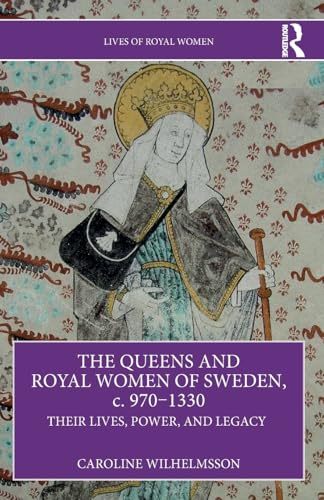
The Queens and Royal Women of Sweden, c. 970–1330
As a new and unique study of Swedish royal women and queens from the Middle Ages, this book deserves recognition. Biographies of both well-known and lesser-known queens make it a valuable resource for students at colleges and universities as well as a new tool for professors and researchers. Students of history, women's studies, the Middle Ages, and social and cultural history will rediscover the true importance of Sweden's queens from an original perspective.
The Queens and Royal Women of Sweden, c. 970–1330: Their Lives, Power, and Legacy by Caroline Wilhelmsson is a compelling examination of the significant royal women in Sweden during the late Viking Age and early medieval period. This textbook uncovers the political power, stories, and struggles of queens in Scandinavian history. Queens of medieval Europe have long been a fascination. This book goes beyond the traditionally mentioned royal women of Europe and provides a new understanding of cultural contributions, painting a vivid portrait of the impact of Swedish queens throughout history.
As a groundbreaking first edition, this is a must-read for enthusiasts of medieval history and women's studies. The Queens and Royal Women of Sweden is tailored specifically for college and university students, instructors, and lifelong learners who are passionate about studies of the Middle Ages, European history, and women’s and gender studies.
Caroline Wilhelmsson is currently a postdoctoral researcher at University College Cork. With her book, she uncovers stories of women who have often been overlooked or misrepresented in traditional masculine historical narratives. In addition, while many works dedicated to medieval queenship concentrate on England or France, Wilhelmsson's focus on Sweden provides a refreshing and much-needed perspective, making this book a must-have for scholars in this area of interest. This book stands out also due to its various maps, family trees, and a comprehensive list of kings, their queens, and royal women. There are several images and artworks portraying some of Sweden's earliest queens as well.
This monograph is unique and is the first of its kind. It includes new perspectives on the historical context of royal women in European history. As part of the Lives of Royal Women academic series by Routledge, this detailed compilation of biographies of Sweden's early royal ladies allows readers to explore their positions, power, influence, and contributions to diplomacy, governance, and cultural advancement in medieval Scandinavia.
The book follows a thematic structure and chapters that explore key aspects of queenship, including the politics and dynamics of ruling, the roles of women in royal courts, and the influence of religion and culture. Wilhelmsson examines artifacts, written records, and architectural evidence to build a vivid picture of medieval queenship. Her focus on these women's lives and historical relevance, as well as including both famous and lesser-known queens, makes the book insightful and moving. The text also delves into ancient royal dynasties and the complex interplay between Christianity and paganism, offering a rich analysis of how these belief systems shaped queenship and royal authority.
The primary focus is on the varied and multifaceted roles of royal women. Wilhelmsson highlights how some women, such as Gunnhild of Sweden, Rikissa (Richeza) of Poland, Gunnhild of Denmark, Margareta Fredkulla, and Ragnhild of Talje, navigated the balance between pagan traditions and the growing influence of Christianity. These queens frequently functioned as political leaders and influencers in their own right, serving as bridges between the cultural and religious worlds. The book also delves into the intriguing concept of women being referred to as monarchs rather than queens, underscoring their ability to wield independent political power within a patriarchal framework.
Wilhelmsson maps the intricate web of relationships between Sweden and other European countries, shedding light on marital alliances and trade in particular. Sigrid Storrada, a queen of Slavic descent whose story illustrates how cross-cultural contacts shaped the royal courts of Sweden and beyond, is a prime example of this. The biographies of these powerful women, who often crossed borders and countries, provide an in-depth look at how trade routes and political marriages fostered exchanges that enriched royal courts and governance, leaving lasting legacies on both sides of Europe.
In conclusion, this groundbreaking book brings to life the stories of medieval royal women who ruled Swedish lands and their enduring impact on history. Wilhelmsson’s dedication to uncovering these narratives is a service to scholarship and society, providing an essential resource for anyone interested in European history, gender roles, and the medieval world. This book educates and inspires, underscoring the importance of preserving and studying the legacies of women whose contributions have too often been overlooked. Anyone seeking a deeper understanding of medieval queenship and the intricate tapestry of European history should delight in this recommended textbook.
Continue reading...
31 notes
·
View notes
Text
Hi folks, I added this to my pinned post but I wanted to highlight it separately from that:
***As of 8/4/2023, I am listing this link and this link as required reading for all new followers who are Christian, were Christian, are non-Jews who grew up in a Christian culture and/or have only learned about Judaism through Christianity, before you follow me. I am being completely serious about this, I don't want you in my space unless you have taken a relatively short amount of time to be an ally to Jews and at least learned this perspective. If you fit this description and have already followed me, it would mean a lot to me if you would also do this. Thank you for respecting this boundary. I am happy to be a resource for people who are learning, but there will be required reading and these links are a prerequisite.***
I have gotten a lot of new followers from this post (among other posts in my "every hour is theology hour around here apparently" tag, but especially that one) and while I love that people are interested in what I'm saying I do want to point out a few things:
I am not a formal scholar of theology or religion, or any type of clergy
I am not a Torah scholar either
I am a random person who has informally studied comparative theology and various source texts on my own time because it's interesting and meaningful to a lot of people, including me
I study Jewish religious source texts in particular because I'm a Jew who is both interested in that type of study and also traditional enough to believe we have a religious obligation to study Torah
I have a vested interest in Jewish-Christian relations and comparative theology because I'm a ger who came from a religious Christian background and my family is Christian
All that said, I am happy to be a resource for people who are learning or want to learn about these same things with me. I am happy to share what I know and learn from others. However I want to be clear from the outset that I am just a person and this is a personal blog. You're gonna see other stuff here. I may not be correct about certain things (unintentionally) due to my lack of formal training.
And most importantly, the links: why?
The reason I am requiring that new folks read those links in particular is because that is the baseline I want for our conversation. I have seen a *lot* of liberal/progressive Christians use antisemitic Christian imagery in their progressive Christian posting, some of it on my post calling for Christians to be allies to Jews.
I don't think anyone is doing this with that intention; I think they are engaging shallowly with that part of my post. I have noticed that A LOT. So many goyische progressives either don't understand and/or don't care about antisemitism, despite caring about every other issue under the sun. I am, unfortunately, quite acquainted with this and it is what it is. But I am specifically asking progressive Christians to step up in a big way because Christianity is the root of a lot of antisemitism for the last 2000 years. Not all of it. But a lot of it.
If you are going to claim to be a progressive Christian, you need to start the long journey of unpacking what you think you know about Judaism. Unless you have studied Judaism from Jews, you need to start with the assumption that you know nothing about us.
Again, I am happy to help people who are learning, but if I see one more person reference the Pharisees or the "cleansing" of the [Jewish] Temple as examples of Jesus being a progressive political rebel, I am going to lose my mind.
182 notes
·
View notes
Text
"Nemu's Buddhist Self-Flagellation"
So it’s been driving me nuts for years that Nemu has so many religious undertones, yet I hadn’t really taken a closer look to figure out with 100% certainty which religion it was. The tie was between Shinto, Buddhism, and Christianity. I’ve always been more partial to Buddhism, but I had to check. LO AND BEHOLD, AFTER CHECKING, THE IDIOT IS BUDDHIST. And that explains so much! And now I need to talk about it. I’ll dedicate a small section at the very bottom separate from the rest (for spoilers from later in Arc 2) to Rabi because it’s crunchy, but most of this essay might honestly be “so this is Buddhism 101” followed by “this is how it applies to Nemu and conditions her character”. Here's the same thing done for Mikoto!
I’ll be explaining concepts of Japanese Buddhism from scratch as well as exactly how they apply to the character, so don’t worry if you don’t know much about it! Note, however, that while I am not Buddhist myself, my research did come from Buddhist sources (both in text form and in the form of, well, People).
You see, as per the Agency for Cultural Affairs Religious Yearbook (I checked years 2011-2023 to account for fluctuation and the general trend of religious decline), roughly 65-70% of the population of Japan is Buddhist and/or Shintoist. The two overlap often so there’s no use trying to categorize people as strictly one or the other. If I must quote the data on Wikipedia for an easier, non-Japanese source (that is also sourced from the Japanese report):
Population figures from the Agency for Cultural Affairs Religious Yearbook 2019, as of the end of 2018, are as follows: - Shinto: 80,219,808 (63.4%) - Buddhism: 91,336,539 (72.2%) - Christianity: 1,921,484 (1.5%) - Other: 7,851,545 (6.2%) Percentages calculated using the official total population figure of 126,435,000 as of the end of 2018.
What I mean to say by this is that Buddhism (as well as Shinto, obviously) has had and still has a significant impact on Japanese culture, way of life, etc. Now, for example, we know Mikoto was raised Buddhist, we know Ryoko is Buddhist, and we know the school everyone goes to in Sankyo Ward is a Buddhist school, but in Japanese media, they often strive for a more secular approach. Plus, especially when it comes to religions like Buddhism, most of the time, unless a character is very devoted to their religion or it’s a character trait the story/writers highlight, you won’t quite notice the signs that they’re religious, and yet chances are they are.
In Nemu’s case, I looked into the way she speaks about certain topics and the words she uses, mainly. For this purpose, I scanned through the entire Japanese script of multiple stories including all of Arc 1. I don’t want to bog this down with too many examples, but I will give you one main indisputable example and mention a few other relevant things later for the actual character analysis. The example in question is simple. Nemu specifically uses the word for Avici (無間) to mean Hell a minimum of two times. That is a very specific word to use, because that my friends is the eighth and most painful of the eight hot hells in Buddhism, the hell of uninterrupted suffering, the deepest level reserved for the worst of the worst! (Nemu’s mental health is doing great why do you ask.) She also uses a word that most often refers to the Naraka realm which contains the sixteen hells of Buddhism (地獄, though this word can also refer to Christian Hell and general hell), when she’s referring to the underworld.
To double down on one of the instances where Nemu uses the word for Avici, I will be very specific and just quote the girl directly. As we know by now, during Arc 1 Chapter 10 Episode 4, Nemu had this fun thing she decided to do where she fully intended to sacrifice herself, and she made a whole death speech, right? Here’s the death speech:
Perhaps this is enough to redeem me. Perhaps with this… I can be forgiven. But if my crime cannot be repaid through any means, I accept the infinite pyres of hell. It may take 349 eons for me to earn mercy, but if I have the story of my wish to now... Even hell's trials will be a blissful dream.
“Perhaps this is enough to redeem me. Perhaps with this… I can be forgiven.” -> Buddhist concept of karma, good actions that ease suffering and cause happiness grant good karma, bad actions that cause suffering grant bad karma. The former decreases the latter.
“But if my crime cannot be repaid through any means, I accept the infinite pyres of hell.” -> This is when the word for Avici is used, and Avici specifically is described in Japanese Buddhist texts as “a vast, fiery realm with immense walls and gates” (kinda similar to Christian Hell in this sense), hence pyres.
“It may take 349 eons for me to earn mercy, but if I have the story of my wish to now... Even hell's trials will be a blissful dream.” -> In Buddhism, unlike in, say, Christianity, wherever you are sentenced to go is never eternal. The duration of a being’s stay in Avici is said to be incredibly long, sometimes described as eons or countless lifetimes. But regardless, the cycle of rebirth continues, and eventually, a being might be reborn into a different realm based on their karma. That is what she means by this, she’s not being dramatic, she’s being rather literal. Oh and for funsies, the various forms of torture people in Avici are subjected to include but are not limited to: being burned, crushed, and dismembered. These torments are not fatal, and people are continuously “revived” to experience the suffering all over again.
As for why Nemu thinks she deserves that, very simple! See, Avici basically represents the ultimate consequence of negative karma. Nemu as a Magius committed several offenses considered extremely serious in Buddhism, which were murder and lying. Maybe three if we count theft…? I am unsure if she would count any of what she did as theft. I’m assuming she is focused on the murder and most importantly the lying and general manipulation of the Feathers (likely made worse by Uwasa shenanigans). Other offenses that can lead to Avici are parricide and slandering the dharma, but those do not apply here.
The Buddhist perspective on Nemu also makes a few other things make more sense than they did before, and it brings up some interesting possibilities, but alas, I must now take a little break from being character-specific to give you a rundown on some bare basics of Buddhism. This is not exhaustive by any means.
Modern Buddhism as per its renewal during the Taisho Era is a lot more about ethical and social teachings, and if you so choose, scholarly pursuit. They put a lot of emphasis on morality, good and bad actions, karma, atonement, etc., and they did (and afaik still do) lots of social justice activism stuff. One should not conflate Western vs Eastern religions, because most of the time, there is no real equivalent between concepts, or at least, it doesn’t match closely enough. Let me explain the main branches of Buddhism a little for clarity first:
My assumption is that a majority of readers will be either Christian/other Abrahamic religion or irreligious (likely raised Abrahamic). So I’ll use Christianity to introduce this part. Christianity has many denominations like Catholic, Protestant, etc., each with its own specific doctrines and practices. Denominations typically imply a more centralized structure and a set of shared beliefs that differentiate them from other denominations within the same religion. Japanese Buddhism, however, is a broader term that refers to the various Buddhist schools and traditions that have taken root and developed in Japan. It encompasses diverse schools with varying interpretations and practices, existing under the broader umbrella of Mahayana Buddhism, which is a broader tradition and emphasizes the bodhisattva ideal (I will define what this is later) and the possibility of enlightenment for all beings. The other main branch of Buddhism is Theravada, which is not prominent in Japan and emphasizes individual enlightenment through strict adherence to the Buddha’s teachings. Therefore, in this sense, Japanese Buddhism is more like a regional expression of Mahayana Buddhism, distinct enough not to be called by the same name and with unique characteristics for its various schools of thought—which themselves may have local variations—while the core foundation remains the same. From now on, assume that different schools of thought may emphasize different aspects of the religion and different parts of it, and we have no way of knowing which specific school of thought any character belongs to.
Now, time to cover some core concepts. I want you to keep three characters in mind while we look at this, and those characters are Nemu, Rabi, and Mikoto. First of all, in honor of how they are traditionally believed to be the first teachings of the Buddha, we have the Four Noble Truths. They diagnose the human condition as suffering (dukkha) and offer a path of liberation from it. The truths in question are, in simple terms:
Suffering exists
Suffering has a cause (craving and attachment)
Suffering can be ended
There is a path to end suffering (the Eightfold Path)
We will get to the Eightfold Path in a second. Another core concept is the Three Jewels, which are the guiding principles of Buddhism:
Buddha, the historical founder (his actual name was Siddhartha Gautama) who achieved enlightenment and showed the path for others
Dharma, which are the teachings of the Buddha, including the Four Noble Truths and the Eightfold Path
Sangha, which is the Buddhist community that provides support and guidance on the path to enlightenment
Something you may have heard often in relation to Buddhism is the word karma and the concept of rebirth. Let me explain this a little more. Those are core beliefs as well, and normally some of the most important to laypeople in the modern day. It’s very simple: actions and intentions (karma) determine the quality of one’s next life in the cycle of rebirth (samsara). The goal is to escape this cycle and achieve enlightenment/nirvana, that’s what they call breaking free from the cycle of suffering and achieving a state of perfect wisdom and liberation. That is one of the two goals of Buddhism, while the other is simply helping others. In ordained groups, this “helping others” often manifests as either activism or working towards the enlightenment of all beings, it’s about the bodhisattva ideal again. Before I define what that is, let me keep talking about karma for a second.
Karma is strictly different from what Christianity calls sin, though in translations people will often go for “sin” because the concept of sin is better understood in the West than the concept of karma. Karma is literally considered a natural law, exactly like gravity. And no one entity applies gravity, do they? The same way that gravity doesn’t have morals attached, doesn’t need to be administered by a mighty god and can produce suffering in some cases and happiness in others, karma doesn’t have morals attached, doesn’t need to be administered by a mighty god and can produce suffering in some cases and happiness in others, since it can be positive or negative. The aren't any real “sins” in Buddhism as we define them in the West, because karma is not a moral system. The actions that are classified as “bad” are classified as such because they will bring more suffering to yourself and/or others. Karma simply says that there are some actions that cause happiness and peace for yourself and/or others, and others that do the opposite. If you stick to the former and not the latter, you will be happier. Because of how sins work in the West (due to, yes, the institutions that run our religions), some folks are tempted to think that if they aren’t caught stealing or harming others or whatever, they will not suffer. But, karma is a natural law and as any other natural law is therefore infallible. By those actions you have planted a seed in your mind that will ripen as suffering when the right circumstances arrive. Even if it takes until after you die.
On this note, in Arc 2 Chapter 1, when Yuna threatened to, in essence and I think literally, split Touka’s skull with her kanabo, Nemu was resigned. She didn’t react, all she said, specifically, is “I suppose that’s karma (因果応報)”. The resignation is because karma is a law of nature. It cannot be avoided. This also puts Touka and Nemu’s self-destructive attempts at atonement in a completely different light. It’s not just remorse. Yes, that’s part of it, and probably the majority of it on Touka’s side, but on Nemu’s? Punishment is inevitable, so they might as well take the bulk of their punishment into their own hands (something something issues with control). Besides, as we saw in Christmas String, both girls believe themselves to be bad by nature, unable to help others or be kind no matter what they do, and Nemu in her hospital clothes costume story, towards the end, also says that being with Ui highlights just how twisted/bitter/perverse she herself is (the line is 自分がどれだけ捻くれてるか 本当に自覚させられるけど). Touka and Nemu do not for a second believe they are capable of accruing good karma, and especially not enough to cancel out all of their bad karma from the Magius era. They’re wrong, obviously, we know that, but they’re just little traumatized babies so we forgive them for being a little bit stupid. Particularly funny with how all of Christmas String was them doing good deeds, most of it of their own free will for a pair of children they didn’t even know at all. But I digress.
Since I mentioned the bodhisattva ideal again earlier, now’s a good time to define what that is. For this paragraph, keep Iroha and Ui in mind. A bodhisattva is a being who has vowed to achieve enlightenment and is perfectly capable of it, but chooses to remain in the cycle of rebirth to help others reach enlightenment as well. They are motivated by immense compassion (called karuna) for all sentient beings, and they are defined by selfless service. Their goal isn’t personal liberation alone, but the liberation of all beings from suffering. Key practices and characteristics of theirs are qualities like generosity, morality, patience, effort, meditation, and wisdom, engaging in acts of kindness and service to benefit others, and using various methods to teach and guide others based on their needs and understanding. Buddhism’s compassion tenet in general is specified as compassion and understanding towards others and towards yourself. But yeah, I don’t think I have to explain why I said to keep Iroha and Ui in mind during this paragraph. I do find it crunchy when a Buddhist character sees another as “unreachable” and puts them on a pedestal because of how Buddha-like they are (embodying the virtues of Buddhism, the bodhisattva ideal).
Moving on, the Eightfold Path is a fundamental concept in Japanese Buddhism just like it is in all other forms of Buddhism. It outlines the path towards liberation from suffering as described in the Four Noble Truths. It’s traditionally divided into three categories:
Wisdom, which refers to developing right understanding and right thought
Ethical conduct, which refers to practicing right speech, right action, and right livelihood
Mental discipline, which refers to cultivating right effort, right mindfulness, and right concentration
The reason it’s called the Eightfold Path is because it has Eight Practices, which are as follows:
Right View, which means having a clear understanding of the Four Noble Truths and the nature of reality
Right Thought, which means cultivating wholesome thoughts free from greed, hatred, and delusion
Right Speech, which means speaking truthfully, kindly, and avoiding gossip or harmful speech
Right Action, which means acting ethically and non-violently, respecting all living beings
Right Livelihood, which means earning a living through honest means that do not harm others
Right Effort, which means putting in the effort to cultivate positive qualities and overcome negative ones
Right Mindfulness, which means being fully aware of the present moment, your thoughts, feelings, and bodily sensations without judgment
Right Concentration, which means developing a state of focused and clear mind through meditation practices
The Eightfold Path is also not a linear progression, but rather a set of interconnected practices that support each other. By cultivating these practices, individuals can gradually progress on the path to enlightenment, or at least that’s what is taught. As a result of the Eightfold Path, common core practices include meditation, ethical conduct, and compassion. Meditation serves to develop mindfulness, focus, and inner peace, though practiced more among the ordained population. The ones most practiced and most highlighted among the laypeople are ethical conduct, which is just following moral principles like non-violence (ahimsa), truthfulness, and simply Not Stealing, and compassion, which is just about empathy and understanding for all living beings.
Let me be clear, there are precepts of behavior in Buddhism and things that are seen as bad/frowned upon for them. Generally, they all cause suffering, except for intoxicants, which attempt to flee from suffering (which doesn’t lead anywhere good, according to Buddhists). It’s stuff like no intentional murder (especially your mother and father), no stealing, no lies, no intoxicants, no sensual misconduct (such as rape or adultery). This last thing is sometimes translated as “no sex at all” due to how prevalent that kind of doctrine is in Abrahamic religions, despite the fact that it’s only in some Buddhist traditions, particularly Theravada Buddhism, that monks and nuns specifically take vows of celibacy as part of their monastic commitment so they can focus entirely on their spiritual practice and detachment from worldly desires. Laypeople from either branch don’t, and neither do monastics of the Mahayana branch, which is the umbrella Japanese Buddhism falls under. The only thing about it is that since the focus of Buddhism for practicing laypeople is on ethical conduct, practicing faithfulness within a relationship and making sure that relationship is healthy is hugely important.
Neeeeext up, the kleshas (煩悩). The kleshas are important and often translated as mental defilements, poisons, or afflictions. In essence, they represent the Unwholesome Mental States that cause suffering and hinder us from achieving enlightenment. A lot of the main kleshas match up with the Christian concept of the Seven Deadly Sins, but again, they are treated more as weeds in a garden and something you have to work through than “Oh You Are BAD Because You Did A Bad!!!”. Buddhism teaches that kleshas are not permanent fixtures in our minds, and so with effort and practice, they can be weeded out. Understanding the kleshas just helps us identify the root causes of our suffering, and by recognizing these Mental Defilements:tm:, we can work on purifying our minds and cultivating positive qualities like compassion and wisdom. The Buddhist practices I’ve mentioned (like meditation) are, in theory, designed to help us overcome the kleshas and achieve a state of inner peace and clarity. The kleshas are bad because they prevent us from experiencing true peace and happiness, which is what the Buddhist teachings are trying to help with.
Interestingly, you know what’s considered a klesha? Ignorance. Ignorance (or delusion), described as a lack of understanding about the true nature of reality, leads to confusion and making poor choices, hence why it’s counted as a klesha. To touch on the ones that match the Seven Deadly Sins for a few examples, envy is defined as resentment towards someone else’s good fortune, which creates negativity and dissatisfaction in yourself. Arrogance (pride) is defined as an inflated sense of self-importance, which causes disconnection from others. Feeling rage (wrath) and the like causes us to lash out or become bitter. Hatred can cause us to act in harmful ways and damage our relationships, not to mention the number it does on our own emotional energy. You see how this works, right? Buddhism isn’t telling you that you’re bad for having human thoughts and emotions and you’re going to BURN unless you pray really hard, it’s gently putting a hand on your shoulder and telling you, hey, you’re hurting yourself, let’s try to help you. However, it does put the responsibility of improving yourself right on your shoulders. That’s your job. Be better. Which… can be hard. Particularly if you’re convinced you can’t do that.
Another commonish concept in Japanese Buddhism is that of honne (本音) and tatemae (建前). It’s about the duality of inner thoughts (honne) and outward expressions (tatemae) in Japanese culture. While not strictly a Buddhist concept, it resonates with Buddhist teachings on impermanence and the constructed nature of reality, and I figure it’s especially relevant in a society that is so high context and polite (and, hey do not externalize your problems or cause trouble for The Collective okay?). The characters to think about here are Nemu with repressed bitterness and anger, and Mikoto with very outwardly expressed bitterness and anger. Mikoto is obvious, and because she was obvious, she got attention. I won’t speak too much about her because someone else is preparing to do so. Nemu, however, internalizes all of her problems and emotions, mostly for people pleasing reasons, as I explained in my other essays, but this is most likely affected by her religious leanings. The scholarly side of Buddhism fits Nemu particularly well.
As an aside before I tell you about Buddhist cosmology, let me explain a little something. If Nemu is a Buddhist, why did she do everything she did as a Magius? Simple. “The good this will do and the happiness I’ll bring to all Magical Girls in the present and the future will outweigh the bad” and if you think about it, becoming a witch means you are doomed to wander in eternal suffering which goes against everything Buddhism stands for. So, in light of that worst case scenario that isn’t even acknowledged by greater society, Nemu will make the sacrifice for the good of the many, to save them. She wants to save magical girls so bad, for both selfish and selfless (+religious) reasons. She was thinking the same way we saw her think in Arc 1 Chapter 10 Episode 4, which was “if I make this great big sacrifice for the sake of good, maybe I’ll be forgiven”. Much like part of why she minimizes her own pain so much is because of the Four Noble Truths telling her that suffering is everywhere and that being alive is suffering—further supported by her being terminally ill and hospitalized for presumably her entire childhood (since her brother acts like she’s a complete stranger), which is not exactly conducive to optimism or to seeing the love and light in the world.
Another extra note on Nemu’s philosophy that is sort of unrelated to the rest of the essay but I had to put it somewhere: Japanese culture is also influenced by Confucianism, which emphasizes filial piety (respect for parents) and respect for teachers. These concepts unfortunately might blend with Buddhist principles in parent-child and mentor-pupil relationships. That and the people pleasing are two of the big reasons Nemu acts the way she does with her family, her parents in particular. She feels the weight of a perceived duty to one’s parents and family, and she doesn’t think she can criticize her parents even when she’s frustrated and/or angry about their behavior, not even behind their backs. Since before she shared a room with Touka and Ui, she most likely spent almost all of her time reading, she most definitely clings to the concept of filial piety as a sort of behavioral guide in her desperation to be loved by her parents. Imagine her alone in the dark, bedridden and in pain, after lights out, crying quietly on the pages of a book about Confucian philosophy and thinking about this, starved for affection and so confused as to why it’s not working. The answer has to be that she’s a burden. Her medical bills, sending her clothes, visiting her, all of it is a burden to her parents. She tries to be as out of the way as possible, as helpful as possible, in hopes of making up for it.
*COUGH* Anyway. Japanese Buddhist cosmology adopts the core ideas of general Buddhist cosmology, but incorporates some unique elements influenced by Shinto beliefs, as you might imagine. For example, for the afterlife journey, the Sanzu River is uniquely important in Japan. It’s usually symbolic (and you can think of it as similar to the Styx in Greek religion), and it’s what separates the world of the living from the afterlife. The difficulty of crossing (calm bridge, rough ford, treacherous shoals) reflects the severity of the deceased’s karma. Based on a being’s karma, they are judged and reborn into one of the six realms, where they will stay temporarily until their karma returns to zero (upon which they will be reborn again into a different realm, as far as I understand).
“Nahi, what do you mean by realm?” Ah! Let me explain. In Buddhism, there are six realms we can exist in. The Six Realms of Existence are:
Deva realm (Heavens), a realm of pleasure and happiness, but temporary as beings' karma depletes.
Asura realm, a realm of jealousy and conflict, where beings constantly compete for power and resources
Human realm, the realm of ordinary humans, characterized by suffering, impermanence, and the opportunity for spiritual growth
Animal realm, a realm of suffering and limited consciousness, where beings are at the mercy of their instincts and predators
Preta realm, a realm of insatiable hunger and thirst, where beings cannot find sustenance
Naraka realm (Hells), basically the realm of intense suffering caused by negative karma
Of course, when a being is sentenced to one of these realms after death, its stay there is never permanent. Japanese Buddhism adheres to the concept of eight hot hells and eight cold hells within the Naraka realm. Each of the hells might be further subdivided into even more specific hells with unique punishments. The eight hot hells are characterized by intense heat, fire, and torture. Pretty similar to most depictions of Christian Hell in that sense. The severity of punishment increases as you descend deeper (something something Divine Comedy). I am unsure if they have actual English names, my source was Japanese, I tried my best here. The eight hot hells are as follows:
Burning Hell (焦熱地獄): sinners are tormented in a blazing inferno
Hell of Black Ropes (黒縄地獄): souls are bound with black ropes and sliced with burning blades
Crushing Hell (衆合地獄): beings are crushed by immense boulders or pressed together in a confined space
Screaming Hell (叫喚地獄): souls endure excruciating pain that forces them to scream incessantly
Great Screaming Hell (大叫喚地獄): even worse than the previous one, with even more intense pain and screaming
Iron Pot Hell (極楽地獄): souls are boiled alive in giant iron cauldrons
Changing Hell (正変地獄): sinners experience constant transformations into different tortured forms
Unremitting Hell (無間地獄): the deepest and most severe hell, with relentless suffering without respite
This last one is Avici, Nemu’s preferred destination apparently. As for the eight cold hells, they are characterized by extreme cold and icy torment. And I give up on trying to translate their names, so here they are:
Hell of Arbuda (鞕抜地獄): souls experience excruciating pain as their bodies develop chilblains that burst open
Hell of Nirarbuda (鞕抜地獄): a continuation of the previous hell, where the chilblains worsen and constantly burst
Hell of Atata (閊陀地獄): souls shiver uncontrollably in the intense cold
Hell of Hahava (臛臛婆地獄): sinners lament in the cold, making "haa" sounds due to the pain
Hell of Huhuva (虎虎婆地獄): souls chatter their teeth uncontrollably due to the extreme cold (yes I know this sounds similar to Atata)
Hell of Utpala (鬱波羅地獄): the intense cold turns the skin blue, resembling a blue lotus flower
Hell of Padma (鉢特摩地獄): blizzards crack open frozen skin, revealing raw and bloody flesh
Hell of Mahapadma (摩訶鉢特摩地獄): the entire body cracks open due to the intense cold, exposing the internal organs
Alina would love some of these. I’m sure she does. But, yes, that rundown was mostly to show you that there are many, many words for Hell that a Buddhist can use, and Nemu specifically used the abbreviation for Avici (無間). So as far as I’m concerned, that and the few other subtler things point towards her being a Buddhist, and it makes for a more interesting interpretation of the character. Nemu has so much trauma and as it turns out, part of it has a religious flavor. Lovely!
To end this off on a positive note, I have this thought for you. Touka and Nemu's final state as Uwasa Queens technically counts as nirvana, enlightenment. They made a selfless sacrifice, let go of all worldly attachments, escaped the cycle of rebirth (since I do not think an uwasa is part of that?). They are at their wisest and kindest, at their best in all ways and are also doing good, honest work and making an effort for the happiness of others. It may not look like the traditional way of achieving nirvana, but... It is definitely their nirvana.
I will write one last very brief section about Rabi, but the essay/lecture has pretty much come to an end here.
Rabi’s entire status of resignation reminds me a lot of Nemu’s. Rabi is resigned to suffer and keeps advancing the hand on her watch and doomposting, despite the fact that it is entirely her choice to do that. In the uh… I hesitate to call it “grand finale of Folklore’s arc” near the end of Arc 2, what she wants to do is end all magical girls to ease suffering. It’s very Buddhist. That’s all.
39 notes
·
View notes
Text
A Khthonic Wiccan Guide to Litha
This is an article from my website, The Witchy Housewife. You can read it at the source here or look under the cut to read it here on Tumblr. If you enjoy my work, please consider subscribing (at the bottom of this page) to receive articles as they're posted via e-mail, exploring the shop, leaving a tip, or reblogging this post. I run this all myself, so all support is greatly appreciated. 💜🔮✨
To those living in the Northern Hemisphere, I bid Litha’s blessings to all who celebrate! We are now officially in summer, marked by the shortest night of the year. The is the highest energies will be prior to the cyclical journey inward which follows, so take advantage of it. Today, I share with you not only the history of this sabbat, but how I observe and celebrate it on my own path as a Khthonic Wicca (which you can read about here).
History & Folklore
Coming from Old English ‘liþa’ (gentle or calm), Litha (pronounced ‘lith-uh’) is one of the eight sabbats of the Wiccan Wheel of the Year which is inspired by older celebrations honoring the first days of summer. It may also be referred to as Midsummer (though it is considered the beginning of summer by our modern calendar). As it occurs during the summer solstice – the time of the year in which the day is at its longest and the night is at its shortest – it is considered a Greater Sabbat, though this does not imply that it is any more important than the four Lesser Sabbats.
Observation and celebration of the summer solstice can be traced as far back as the Neolithic era, and monuments all over the world including Stonehenge, the Standing Stones of Mountseskin, the Externsteine temple, the ruins of Chaco Canyon, the Serpent Mound, the Osireion temple, the Great Pyramids, the Essene Monastery, the megaliths in Nabta Playa, the Ajanta Caves, and more highlight the position of the sun as it stands at it reaches its peak. Though historical accounts from these regions don’t date back quite far enough for us to know what specific traditions occurred during that time, the historical accounts we do have paint the summer solstice as a time to celebrate the sun, sacred fire, healing waters, and the bounty of the land – a brief repose from other agricultural festivals throughout the year which came with the toil of sewing and harvest.
Bonfires were held, often on hilltops, to send up prayers for fertility and much-needed rainfall. In Celtic traditions, burning wheels were sent downhill to symbolize the cycle of the sun. The Sioux, Natchez, Hopi, and numerous other Native American groups performed ceremonial sun dances. The Vikings met to resolve legal matters and other disputes. Ancient Romans made merry at temples of Fortuna. Other relevant festivals include the Slavic Kupala Night from Proto-Slavic kǫpati (to bathe) and the Feast of Epona, a Gaulish protector of horses and mules.
In addition to seasonal celebrations, the time around the summer solstice was (and still is) a popular time for weddings. The month of June itself was named for the goddess Juno, whose domain included marriage. In some traditions, May was considered a time of marriage between gods and was, therefore, making the month which followed a much more appropriate time for mortal weddings. Further, the etymology of the term “honeymoon” may – though evidence is scarce – trace back to the Anglo-Saxon full moon of June being dubbed the Honey Moon. As the observation became Christianized, it also became a popular time for baptisms.
With the advent of Christianity, the observation of the summer solstice became a celebration of Saint John the Baptist, whose birthday was said to be on June 24th, exactly six months before the birthday of Jesus Christ. Biblically, John 3:30 states: “He must increase, but I must decrease.” This was in reference to St. John’s role as the preparer of the way for the importance of Christ, which serves as a mirror for the cyclical battle between day and night for dominance of the skies. The celebration started with a vigil on St. John’s Eve. Doors were dressed with St. John’s wort, birch, fennel, white lilies, and oil lamps which burned through the night. The next morning, as with prior Midsummer celebrations, St. John’s Day was celebrated with fire: One of clean bones called a bonfire, one of clean wood called a wakefire, and one of both bones and wood called St. John’s Fire. The latter was said to drive away dragons, witches, and evil spirits, and women in Cologne would go to the Rhine River to wash away any lingering threats.
The name Litha as it is used by its observers today comes from the reconstructed Germanic calendar, which refers to the months we know as June and July as Líða. This was further popularized by J. R. R. Tolkien in The Lord of the Rings series, in which the month of June is called Lithe (the Bree Calendar) and Forelithe (the Shire Calendar). Today, festivals dedicated to the summer solstice continue all over the world. One of the most well-known festivals, next to the observation at Stonehenge, is that of the Sankthansaften (St. John’s Eve) in Denmark, celebrated with traditional Midsummer music, fireworks, and massive bonfires. In New York, a free all-day outdoor yoga event covers the Times Square. California holds a multi-day Summer Solstice Celebration in Santa Barbara. In Sweden, it’s such a significant day that there have been proposals to celebrate the day as the National Day of Sweden, and Midsummer has even made its way to the status of a public holiday in places like Estonia, Finland, Latvia, and Lithuania. It’s also worth noting that this just barely scratches the surface of the number of modern day summer solstice observations.
In Khthonic Wicca
In Persephone’s cyclical seasonal journey, Persephone and Demeter thrive in their reunion as mother and daughter, and lifeforce energy upon Gaia is at an all-time high. The solar energy of Helios has reached its very peak with the continued assistance of Apollon, Hemera, and Aither. This is the final burst of energy we will receive before we begin our journey inward.
In domain, Apollon may be honored as a parallel to St. John and other solar gods throughout history, with Helios, Hemera, and Aither honored beside him as deities of Sol, day, and light. Hera should most definitely be included in any wedding festivities, especially since we honor her during the month of June in general. Poseidon may also be honored for both his water aspects and his connection with horses. I would also add Dike, per my personal associations for her. As with every Khthonic Wiccan observance of the sabbat, we also take time at Litha to offer prayer to the Sacred Triad, to the Olympioi, and to the Protogenoi in accordance with seasonal shifts in energies.
As acts of service around this time of year, the most appropriate thing to do is to take on or assist in solar energy projects.
Sabbat Correspondences
As mentioned in the previous section, the best possible parallel for St. John on this particular path would be Apollon, with Hera and Poseidon serving as parallels for other deities honored at this time.
In Wicca, we reach the end of Divine Youth – the Maiden Goddess and the Youth God. The two figures are now joined in marriage and in love, and, and the Maiden Goddess becomes the Mother Goddess as she is impregnated by the Warrior God soon to reach the height of his power. Kosmos gives way to Existence. Gaia gives way to the Tangible. Courtesy of Persephone, Vibrant Life can now be seen everywhere you look.
Plants: St. John’s Wort, Honeysuckle, Sweetgrass, Sandalwood, Oak Minerals: Sunstone, Carnelian, Citrine, Tiger’s Eye, Gold Colors: Gold, Orange, Yellow, Blue White Animals: Bull, Horse, Eagle, Frog, Hippogriff Symbols: Solar Wheels, Solar Crosses, Pinwheels, Seashells, Merfolk Tarot: The Sun, Strength, The World
Litha Ritual Ideas
If you are able to, a prayer to Helios, Apollon, Hemera, and Aither at sunrise is a perfect way to start your Litha morning, followed by day of barbecuing, swimming, and merrymaking and an evening punctuated by a bonfire. Litha should not be a stressful celebration by any means.
You may also choose to charge water with solar energy today to use for mopping the home and helping to keep that solar energy in your space as we approach the coming darkness of autumn and winter. In addition, I like to charge any charms I’ve made for success, confidence, and creativity in the Litha sunlight. You can hang the charm in your workspace or carry the charm on your person for added confidence when out and about, depending on what your particular needs are.
I also like to collect rainwater when necessary during the summer for any healing work I may have to do. Just be sure to keep an eye on it for any signs of mildew if you plan to keep it on hand for a bit.
Litha Spread Ideas
If you’re doing a barbecue, you have so many simple options – beef, pork, chicken, lamb. Everything tastes good when grilled. For those who don’t eat meat, I’m a big fan of barbecued carrots. This goes super well with a refreshing summer fruit salad (with Tajín for a little zest, if that’s your thing) and a pitcher of sun-made southern sweet tea with lemon. You could also do any type of citrus water, juice, or wine you prefer.
For an indoor meal, my preference is a creamy lemon chicken dish – whether on its own or in a pasta – with a healthy heap of sundried tomatoes. Roasted summer squash makes the perfect side for this.
For Your Reference
The Digital Grimoire provides a plethora of free resources on witchcraft, Khthonic Wicca, and more. As of today, a quick reference for Litha has been added to the Sabbats subsection, available here on my website any time you should need it. Until my next article, have a very blessed Beltane!
#TWHArticleShare#persephone#hades#hecate#apollo#witchblr#witchcraft#wicca#the witchy housewife#my content#my articles#litha#sabbats#khthonic wicca#summer#hekate#haides#kore#apollon#midsummer
5 notes
·
View notes
Text
By: Ian Golan
Published: Jun 5, 2024
There’s a modern Christian custom to include a reference to a Bible verse in Twitter bios, Instagram descriptions, and even Tinder profiles. Whenever I encounter this, for whatever reason, I feel compelled to check the actual passage. I open an online Bible and enter the numerical code into the search engine. I want to know: Which sentence from God changed their life so monumentally that they chose to highlight it on social media?
Every single time, without fail, I’m disappointed by the verse I find.
Though the urge to share a favorite biblical passage doesn’t seem to be a coordinated effort, some sort of herd instinct must be at play. Almost all of them come down to just a few quotes repeated endlessly across platforms. These popular verses are remarkably unimpressive. Even when an uncommon passage is chosen, it tends to be unremarkable. This issue is not limited to social media; whenever I encounter Christians, I am baffled by the portions of the Bible they consider worth sharing with an unconvinced audience.
While the Bible is often revered, it is also, quite frankly, boring. At least, the parts that believers are comfortable sharing are. I’ve yet to encounter a Christian proudly quoting verses that command, for example: “One shall not suffer a witch to live,” or describe God sending bears to kill children who mocked his prophet for being bald, or depict the gruesome massacre of Egypt’s firstborn by the angel of death.
The Book of Boredom
The books of Proverbs, Psalms, and most of the Epistles are utterly uninteresting in terms of moralistic conclusions for our lives. They are intriguing when one delves into issues of their authenticity, the early Christian infighting between Paul and Peter, or the evolution of theological views away from Jesus’ teachings. However, in terms of inspirational content, they fall short compared to other religious texts and are inferior to many ancient or later philosophers.
To play the devil’s advocate, the impact of the Bible on European and American culture may have stripped it of its novelty and meaning, making its ethics seem obvious to Western readers. However, even with this consideration, the Bible still falls short. I cannot imagine seeking advice on how to live my life from the Bible, not because of my anti-theist bias, but simply because the content is inadequate.
As a practicing teenage Catholic, I forced myself to study the Bible through strict self-control. I knew it was important to know the book sent by God, but I was always unimpressed. The priest’s long-winded instructions based on the passages never resonated with me. Today, I barely remember any of the teachings. I don’t think I was an anomaly among churchgoers, but the norm. An honest introspection by Christians would likely reveal that biblical passages are neither momentous nor significant to their ethical decisions.
The Omniwriter
This observation is devastating to supernatural claims about the Bible. As a writer, albeit maybe a mediocre one, I do not excuse bad writing, not even for divine beings. Given enough time, I could significantly improve any piece of writing, choosing words precisely to convey my intent perfectly. Imagine the intricate plot crafted with unlimited hours of thought, telling the most engaging story ever. This is what we should expect from God the Omniwriter.
If God embarked on the task of crafting a text to communicate his will perfectly to humanity, it would be the best book in history. Every page would be a masterpiece, worth endless hours of study. The perfection of the text itself would argue for a supernatural creator capable of such literary supremacy. This is the standard we should hold every Christian apologist to when they claim the greatness of the Bible. This is the book we should expect under the Christian worldview, but it is certainly not the Bible.
The Missing Awe
Think of the most intense feeling you’ve had while reading a book—perhaps the sense of dread for the fellowship of the ring in Tolkien’s novel or the awe at a philosopher’s observation. Have you ever felt such intense emotion reading the Bible? Have you had sleepless nights because you couldn’t put it down? I’ve had such experiences with many books, but never with the Bible. I never fell asleep with my head on the Bible, captivated by its text.
My experience is clear, and I guess yours might be similar. A major reason for this guess is the widespread ignorance of the Bible among Christians. The fact that I can fluster them with well-chosen passages that contradict their moral intuitions or established Christian myths shows that the Bible is not as great as claimed. Believers struggle to stay captivated by the Bible, a struggle that should not exist. Believers of a religion with a sacred script from an omniwriter would be such vehement scholars of this book that no atheist attack could succeed.
However, the Bible is so lackluster that it can even lead to deconversion. Penn Jillette, in the episode “The Bible: Fact or Fiction?” of Penn & Teller: Bullshit!, said:
“Take some time and put the Bible on your summer reading list. Try and stick with it cover to cover. Not because it teaches history; we’ve shown you it doesn’t. Read it because you’ll see for yourself what the Bible is all about. It sure isn’t great literature. If it were published as fiction, no reviewer would give it a passing grade. There are some vivid scenes and some quotable phrases, but there’s no plot, no structure, there’s a tremendous amount of filler, and the characters are painfully one-dimensional. Whatever you do, don’t read the Bible for a moral code: it advocates prejudice, cruelty, superstition, and murder. Read it because we need more atheists—and nothing will get you there faster than reading the damn Bible.”
While atheists probably shouldn’t start giving out pocket Bibles to deconvert believers, the inadequacies of the Bible are a strong argument against its supernatural origin.
==
Even Xians don't believe the bible is as great as they pretend it to be. If they did, they'd have all read it, multiple times. They wouldn't be able to put it down because it's their magical space wizard talking to them through his prophets.
2 Peter 1:20-21
Knowing this first, that no prophecy of the scripture is of any private interpretation. For the prophecy came not in old time by the will of man: but holy men of God spake as they were moved by the Holy Ghost.
You know, except when it's a forgery. Or a metaphor. Or no longer applies.
They haven't.
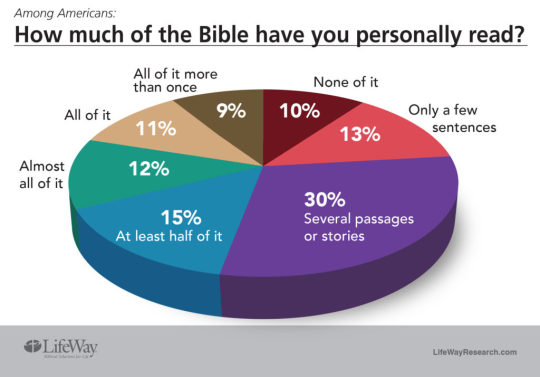
13 notes
·
View notes
Text
"I was arrested and sued by the state for politically related and gang-drug-related criminal codes. When I’m facing court, I am not bailed. So, I ended up being arrested and put in prison. During my early days in prison, a prison guard imported a book for another prisoner who hadn’t arrived yet. Being a bookworm, I was interested and requested to have the book before the owner or prisoner arrived. It turns out the book was the Bible. Since it’s a used book intended for that prisoner who happened to be a pastor, the book has a lot of written notes, highlighted references, and so on. So, I had the chance to learn from his perspective. However, let me be clear here. I didn’t read the Bible as a believer. I read it as an atheist.
Since I was a political prisoner and also have been accused of having relations with gang-drug-related criminal activities, I was moved to Insein prison. In Myanmar, there is no option for us to register as an atheist or a non-religious person for state-related documents. I had to register as a Christian so I could import the Bible into the prison. During my early days in Insein prison, I’m free except for my court date. Officially, I am not yet supposed to be a forced labor prisoner since I’m still facing court and not yet sentenced. However, since my family never had the chance to visit me in my prison days and I didn’t have financial aid to pay the prison guards and the gangs within the prison, I was treated as a forced labor prisoner.
Forced labor includes carrying swage (filth), carrying out farming activities, and so on. In such situations, I noticed a lot of people try to find their purpose in prison life through religious faiths and teachings, given these inhumane treatments against them. Some put their faith in supernatural beings like God, Allah, and so on. However, for me as an atheist, I observed the situations in a rational and realist sense. I noticed that everyone has lost their cause and has become alienated and fragile.
So, I tried to find my comfort zone in prison. Unlike others, rather than hoping to believe in a supernatural being like God or Allah to help me get out of prison, I tried to find ways to organize people in prison. In Insein prison, there were multi-faith worship places and Buddhist pagodas where people could carry out religious activities. So, I tried to organize a Christian community and build a small church inside Insein prison. With the increased number of Christians in our sector and the non-Christians who are interested in our church activities, I became an organizer and managed to climb some ranks within prisoners. Later, I became a prisoner who could delegate people to the tasks they did in prison. Within our church, we managed to set up a communal society where we all shared our own fruits of labor by contributing to farming activities and so on.
Finally, we managed to set up an officially recognized Anglican church, and the authorities accepted us. Even though I was the founder of that Anglican church inside the prison, I was never baptized, and I never had faith in religion. I did it so I could use Christianity as an identity to unite the people for a greater cause of communal conscience. Everyone in my Anglican church from Insein prison thought of me as a devoted Christian.
Later, I was sentenced to 16 years by the court. I was moved to a different sector within the prison. So, I was separated from the church I founded. I was depressed a lot, honestly. With 16 years of prison time, my parents might not be alive by the time I am released. With their socio-economic conditions, they cannot visit me too often as well. Even my partner at that time stopped visiting me after one year of my prison time. So, I was left with nothing. Even if I am released after my 16 years of prison time, I will be in my 40s, and it will be really difficult for me to start a life again outside of prison.
To find refuge for my desperation, I attended short Vipassana meditation seminars in prison. Of course, my former colleagues and friends from the church are so pissed at me for that. I don’t really care, honestly. My intention in setting up the church since the beginning was never about religion; it was all about organizing the people to find some greater conscience. Generally, the meditation was helpful to an extent because my mind became calmer while I’m sitting in meditation."
-Hein Htet Kyaw, "Interview with Thiha, a lifelong anarchist thinker from Burma"
39 notes
·
View notes
Text
Dust, Volume 10, Number 12

Olivia Tremor Control
Another year of Dust goes into the books with this final edition. We’ve relished the chance to work in short form, covering small label releases and chart-toppers, new music and worthy reissues, across a lot of genres but leaning heavily on jazz, folk, punk and experimental music. We hope you’ve enjoyed it, too, Here’s to continuing that, at least, in 2025.
This month’s contributors include: Bill Meyer, Patrick Masterson, Tim Clarke, Ian Mathers, Alex Johnson, Jennifer Kelly, Jonathan Shaw, Christian Carey and Bryon Hayes.
Abdou / Gouband / Warelis — Hammer, Roll and Leaf (Relative Pitch)
youtube
When applied to improvising musicians, residency usually refers to a sequence of gigs at the same club. This session, a first-time encounter for the trio but not for its component parts, takes another tack. The hour of music on Hammer, Roll and Leaf was tracked in alto and tenor saxophonist Sakina Abdou’s home over the course of four days, two of which were taken up with gigs elsewhere. So, we should we call it a residential residency? At any rate, one supposes that the shared time in close quarters contributed to the music’s charge. It has a feeling of excitement in becoming. They’re not just improvising; they’re figuring out who they are as a trio. Each musician brings both flexibility and a strong individual presence. Martha Warelis is as comfortable inside the piano as she is at the keys, and she uses that combination of hardware rumble and high-wire line-tracing to give the music shape, motion and space. Toma Gouband’s penchant for playing with stones and branches filters the conventional spectrum-filling function of his drum kit, and his astute placement of small sounds invites one to listen for the details. Abdou thrives in their company, find a complementary stance for whatever her fellows throw at her. Great stuff.
Bill Meyer
Barker / Parker / Irabagon — Bakunawa (Out of Our Heads)
Andrew Barker is a drummer, improviser and composer based in New York whose cv includes Gold Sparkle Band, Acid Birds and a host of endeavors that blur the line between solo and collaborative. Take this one, for example. Barker put the date together, but when you call on William Parker (heard here on bass, B flat pocket tuba, and a Catalan double reed instrument called a gralla) and Jon Irabagon (tenor and sopranino saxophone), you don’t do so in order to shove music stands under their noses. Each musician adds such personality and imagination to their parts that the shared compositional credits make perfect sense. Each of the LP’s four (five on the download) tracks explores a different tributary off the free jazz stream, pushing back the mapped zone of exploration just a bit.“Fly Anew,” for example, swings with burly muscularity, while “Morgan Avenue Second Line” fractures and scrambles said line into an expression of confrontationally dancing sound, like martial arts sparring match between three choreographers.
Bill Meyer
Batu & Nick León — Yiu EP (A Long Strange Dream)
youtube
Bristol’s Batu and Miami’s Nick León are both club vets at this point — the former via numerous late UK bass singles and ownership of both the Timedance and A Long Strange Dream imprints, the latter an adventurous remix workhorse whose 2024 highlight ended up being an Erika de Casier collaboration. Closing out the year with their first EP together, Yiu thrives on the tension between Bristolian bass weight and the lighter, faster beats of Miami’s Latin scene. The eponymous track, originally heard in León’s Dekmantel mix, is the highlight, snagging a reggaeton rhythm and marrying it to swirling, dissonant (but not unpleasant) synths. Don’t miss the bubbly “Tuvan” (yes, there is throat singing incorporated) or the dashing “Palo,” either, though. For just four tracks, a great deal of ground is covered; let’s hope this just scratches the surface of their potential together.
Patrick Masterson
“Deadly” Headley Bennett—35 Years from Alpha (On-U Sound)
youtube
If you listen to Studio One reggae, you know Headley Bennett’s playing, even if you don’t know that you know. As part of the core session crew, his spreadably rich alto saxophone is all over the label’s discography, but as a consummate sideman he managed to make it to the age of 50 without making a solo record. When he stuck around London after a tour with Prince Far I, Adrian Sherwood recognized an opportunity to right a cosmic wrong and put him in the studio with drummer Style Scott, singer Bim Sherman and a posse of creatively named On-U Sound regulars. The combination of Bennett’s fluid melodies and Sherwood’s muscularly dubby, percussion-forward production is inspired. Every boingy syndrum, ardently crooned lyric and echoing beat has a reflective surface that points attention to the saxophonist.
Bill Meyer
Blawan — BouQ EP (Temesc)
The longer South Yorkshire producer Jamie Roberts is left to his own devices, the weirder his songs get. Using his literal voice more than ever and letting in a lot more light than his typically aggro, industrial-leaning productions account for, BouQ covers considerable post-dubstep ground for him on the big room highlight “Fires” alone. Lest it be misunderstood, Blawan isn’t going James Blake singer-songwriter mode or getting confessional instead of confrontational, but the more discernibly human touches and melodies of this four-tracker are a distinctive step to the left. It suits him; more than another Persher album or even an extended hardware-only Karenn set, BouQ is the sound of an opportunity, of fresh potential from a guy who’s lived through club trends of the last decade and a half and still has something left to give.
Patrick Masterson
Bursting — Bursting EP (No Sabes)
Bursting cites Jawbox, No Knife, Drive like Jehu and Shiner as musical reference points for its debut six-song EP, but even with that and pedigrees of bands including Coliseum, Stress Positions and Thou, the thing “Trade in Time” reminded me of most immediately was early Foo Fighters. There’s a subtle multitracked quality to Kortland Chase’s higher register that recalls Dave Grohl in his first years after Nirvana and the music never feels too heavy — but far from a negative thing, this just paints Bursting as distinct from its creators’ biggest projects. There’s no question you can hear Jehu’s most driving Yank crimes on “Play It Nice,” but taken as a whole, this is a solid slab of 1990s-indebted indie-rock skirting the perimeter of knotty post-hardcore as it was then delivered. Put another way: It’s easy to imagine a 1995 where “Dark Phase Manager” is an alt-rock radio staple (complementary).
Patrick Masterson
DJ Sabrina the Teenage DJ — Sorcery (Spells on the Telly)
youtube
It’s unnerving how prolific DJ Sabrina the Teenage DJ is. The still-anonymous London producer properly broke through with the three-hour odyssey Destiny, a mind-bending 41-track melange of sunny, psychedelic, sample-heavy house the likes of which most people hadn’t heard since the Avalanches’ Since I Left You heyday. That was August 2023. Normally, you’d take a moment after that to make a victory lap, catch your breath and see where you’re at artistically, assess what you want to do next. But that’s you, a mortal; what Sabrina did instead was release two singles and three albums, one of which (Hex) has two companion albums unto itself. The latest (though only a fool would bet on it being the last) 2024 release is the 14-track Sorcery from early December, which fails to dip in the quality we’ve come to expect. Despite oft-straightforward 4/4 rhythms, the sheer density of these productions — which have to look like a nightmare in ProTools, incidentally — boggles the mind. What does her process look like? When does she sleep? How the fuck is this possible? The answer has to be right there in the title; nothing else seems plausible.
Patrick Masterson
The Green Child — Look Familiar (Hobbies Galore / Upset the Rhythm)
The self-titled 2018 debut by the duo of Mikey Young (Eddie Current Suppression Ring, Total Control) and Raven Mahon (Grass Widow) was an uncanny gem. Its deadpan space-pop felt like the soundtrack to an odd, dated nature documentary. On album three, Look Familiar, the duo are joined by Alex Macfarlane (The Stevens, Twerps) on guitars and synths, and Shaun Gionis (Boomgates) on drums. The resulting sound is much fuller and more propulsive, with a motorik bent and a twist of glam swagger. The title feels like a nod to the fact that several of the songs have elements that are reminders of a diverse range of other songs, such as Fleetwood Mac’s “Tusk” (“Easy Window”), Boards of Canada’s “A Beautiful Place Out In the Country” (“A Long Beautiful Flowing Cape”), and even Wang Chung’s “Dance Hall Days” (opener “Wow Factor”). The eclecticism in these reference points is a good indicator of this album’s tunefulness and likeability.
Tim Clarke
Haptic — Sensitive Dependence on Initial Conditions (Line)
One could accurately characterize the entire timeline of the Chicago-identified trio Haptic as a shift between the poles of outreach and interiority. Originally formed expressly to perform live, with guests, extended episodes of geographic separation brought out their latent tendencies towards audience-free interaction. The title tips the hand of this recording, which can be considered an experiential confrontation with destiny. For while the musicians added to, subtracted from, processed and otherwise manipulated sourced from a one-day session at Chicago’s Experimental Sound Studio, they kept coming back to the original sounds. Which is not to say that it sounds like what they played; rather, what you hear was fileted from the original sound capture, dredged through field recordings and room sounds, and then shaken until only a light dusting of influence remained. There are long stretches where it sounds like a rank of long electronic tones tucked behind a cloud bank of room sound, and this immateriality makes the choice to release it only as a digital download feel like an artistic choice to make format congruent with content.
Bill Meyer
Hirsch Swell Clouse Parker — Out on a Limb (Soul City Sounds)
To spell it out, that’s Steve Hirsch on drums, Steve Swell on trombone, William Parker on bass and Jim Clouse on soprano and tenor saxophones. All of them save Minneapolitan Hirsch are New Yorkers who spend a lot of time in Clouse’s Park West Studio, and there’s a rapport between them that contributes to this music’s apparent effortlessness. The horns glide and tangle, then stop and smear textures as one; the bass and drums have a leap-frogging dynamic that keeps the music moving even when one of them temporarily plunges into space and then pops back up, gleefully gravity-defiant. Soulful and free-flying, his is free jazz that inhabits the moment and makes you want to live in it too.
Bill Meyer
Hypnodrone Ensemble — The Problem Is in the Sender—Do Not Tamper With the Receiver (WV Sorcerer Productions)
youtube
About all you can count on with a release from this group led by Aidan Baker (Nadja) and Eric Quach (thisquietarmy) is that those two will play guitar, there will be at least three drummers (here Fiona McKenzie, Angela Martinez Muñoz, and Sara Neidorf), and that things are indeed going to drone hypnotically. On this outing, in addition to past contributor Gareth Sweeney returning on bass, there’s a first: vocals, by Lane Shi Otayonii (Dent, Elizabeth Colour Wheel). Otayonii’s wailing vocals are equally entranced and entrancing and fit surprisingly well with the roiling boil the rest of the Ensemble can whip up seemingly on command. The result is just as easy to get lost in as their other LPs, but in a whole new head spinning way.
Ian Mathers
Licklash — Big Smile (Roolette)
youtube
Here’s hoping you have at least 12 minutes for punk rock today. Listen just one time through Big Smile, the debut EP from Melbourne duo Licklash, and you’ll have gotten a satisfying pummel from these four furious, bouncy polemics. The pleasures of the blurted but flowing last verse of “Party Line” or the pounding, angular rhythm guitar on “Battleship,” for example, are immediate. But leave Big Smile on for another round and you’ll find a carefully constructed, complex record that, despite its four-year formation, never sounds over-thought or precious.
Big Smile was entirely and admirably produced by the band — guitarist and vocalist Kahlia Parker and bassist Carsten Bruhn. The mix is clean and balanced and spotlights the subtleties: the crinkled buzz of Parker’s lead riff on “Battleship” or the high, bent notes that orchestrate the music into intervals of calm, of form meeting content, however briefly, on “Control.” Achievements in production noted and appreciated, you’ll keep coming back to Big Smile for the polemics and the pummeling; for Parker’s sharp, indignant delivery of the group’s frantic, funny-until-dead-serious lyrics and headlong, hard struck instrumentation that manages both hardcore intensity and a bumping groove.
Alex Johnson
Low Animal — Bedlam Hiss EP (Decapitator)
I’m not saying it’s Low Animal’s fault my tinnitus is beyond repair — you’re talking to a guy who saw My Bloody Valentine without earplugs in his younger, dumber years — but I’m also not saying they helped at a recent gig in support of Flint grunge staples Greet Death. The flamboyant Chicago quintet knows where their bread is buttered, and on recent three-tracker Bedlam Hiss, they put that noise-rock know-how to tape with a screeching, smashing, soaringly irrepressible pummel. There are a not-unnoticeable number of bands, led by Chat Pile, currently out there demonstrating what they’ve learned from The Jesus Lizard … but I can assure you that few of them match the sonic intensity of Low Animal. The EP doesn’t quite do the live experience justice, so take it from one who learned that too late: Do not leave those earplugs at home.
Patrick Masterson
Lunar Noon — A Circle’s Round (self-released)
youtube
Michelle Zheng was reading works by the Vietnamese Buddhist and peace activist Thich Nhat Hanh when she started composing A Circle’s Round, and his thinkings on action, inter-being and connection to all living things permeates the expansive contours of this art-song cycle. The sounds of nature weave through sophisticated, large ensemble arrangements. Indeed, the very first sound you hear is running water. Yet this is no meditation-inducing drone. Zheng constructs shimmering, multi-layered compositions out of choral vocals, strings, piano and other instruments, and enlivens them with constant interlocking motion. Her core band includes half a chamber quartet in violinist Brian Lach and Christopher Healy, plus drummer Théo Auclair, and she herself sings and plays piano and synths. Some cuts like “Forgettable Consequences” swagger with jazzy urbanity. Others, such as the closer, “The Other Shore,” billow with lively voices at play. “A Circle’s Round” percolates and shivers, approaching Jon Hopkins electronic ambiences. Lovely and complicated.
Jennifer Kelly
Mahall / Stoffner / Griener — Die Exorzistin (Wide Ear)
Give this record’s sleeve a good look. The artists have gone to the trouble of packaging the CD in a 7” single sleeve, thereby guaranteeing two things; it won’t get lost in the same stack as the other slimline CD sleeves, and fading jazz-head eyesight stands a better chance of registering the details of the dense, irreverent collage on its sleeve. Neither the image nor the music it encases seeks to provide comfort. Drummer Michael Griener and clarinetist Rudi Mahall have a partnership that has endured since they were both teens, and they are as jointly fluent in mid-20th century swing as they are in elbows-out free improvisation. They zero in on the latter end of the spectrum through this album’s 17 spiky and generally pithy tracks. Mercurial and agile, they make music like a pair of swordsmen who are just itching for a chance to evade the rules and poke holes in each other’s favorite smoking jackets. Electric guitarist Florian Stoffner is equally nimble, but he brings a clanking sonic ballast to the proceedings.
Bill Meyer
Anne Malin — Strange Power! (Dear Life)
North Carolina poet and songwriter Anne Malin brings an extended ensemble to her fifth full-length, moving away from the ghostly tremors of 2020’s Waiting Song (“These songs have a fey, otherworldly quality,” said Dusted.) towards a surer, more communal sound. There’s nothing spectral about “North Carolina,” for instance. The tune pays tribute to the white sand beaches of Malin’s home state, trace-like percussion, pedal steel and piano flourishing around her warm, twining melodies, while “River” undulates with the warmth of Lily Honigberg’s violin. Still, “Lilac Bloom” is as delicate as the blossoms it celebrates, and wavery washes of surf guitar arise around its slow lament. And edging back into goth, “The Visionary” quotes a poem by Emily Brontë, Malin’s voice echoing the novelist’s 19th century, death-haunted romanticism. Strange Power! builds a narrow bridge between this world and the next.
Jennifer Kelly
Nate Mercereau — Sundays (How So)
youtube
Nate Mercereau is a guitarist, sampler and composer who has worked with a long list of high profile musicians, from pop icons like Lizzo, Shawn Mendez and Andre3000, to jazz innovators like Idris Ackamoore and Kamasi Washington. For Sundays, Mercereau pairs with avant percussionist/synthesizer whiz Carlos Niño for a set of radiant, synth-heavy dreamscapes that however somewhere between prog and fusion jazz. Mercereau infuses his music with light and air and nature. When birds twitter in the interstices of “Every Moment Is the First and Last,” and you can almost feel the sunshine pouring in. “Absolute Sensitivity” sits cross-legged in a meditation garden, letting the long tones vibrate, mutate and fade without forcing them into melody. On the downside, these cuts can feel disembodied and imaginary, an unreal landscape too pretty to buy into. However, bits of organic music—alto flights from saxophonist Josh Johnson, kit drums from Jamire Williams—provide some grounding.
Jennifer Kelly
Non Bruises — II (Just Because)
Ohioan Mike Uva returns to his electrified Non Bruises project for a second round, cutting back on the lyrics-focused song structure and zooming in on guitar tone. Thus, “Silent Partner” cuts back to the words to a recorded (and uncredited) inspirational speech, building a slow bloom of post-rock guitar and drums around it. “Moto Rick” is a sharper vamp, all driving guitar/bass/drums for a long time before picking up some thready vocals. Standout “Evelyn Martin,” credited to guitarist Andy Stibora, has a bit more of the first record’s lo-fi GBV-into-Pavement grace, but most of these cuts groove rather than hook. “Taster,” a Grandaddy cover near the end, looms and hazes and resolves, a reminder that the fuzz has to have a center somewhere. We liked the first Non Bruises a lot here at Dusted (“an album that could take its place in your small rack of favorites”) and this one a bit less.
Jennifer Kelly
The Olivia Tremor Control — “Garden of Light” / “The Same Place” (Elephant 6 Recording Co.)
youtube
Two new songs by legendary psych-pop band The Olivia Tremor Control were recently released as part of the soundtrack to the Elephant 6 Recording Co. documentary. Then, a matter of hours later, news circulated that Will Cullen Hart had died of a heart attack following a decades-long struggle with multiple sclerosis. The experience of listening to these two songs is not only colored by the news of Hart’s passing, and that of Bill Doss before him, but also the sinking realization that the long-gestating third OTC LP may never see the light of day without Hart or Doss at the helm. Having said that, the strength of the E6 musical community, so beautifully depicted in the documentary, may work miracles once the sting of Hart’s passing has begun to fade. For now, these two songs are premium, essential OTC. “Garden of Light” is classic Doss, full of bright, major-key jangle, harmonized vocals, and Beatles-esque guitar breaks, while Hart’s “The Same Place” could have come straight off the first Circulatory System LP with its mournful cellos and dreamy sway.
Tim Clarke
Ploughshare — Second Wound (I, Voidhanger)
youtube
Angular and dissonant, Canberra-based black metal band Ploughshare makes music that seems like it would be more at home in Norway or Northern France. But black metal is global, and always has been; the Scandi bands get the most buzz for breaking the form open, but Brazil and England were likely more important sites of early articulations of the genre’s visual style and unslakable need for infernal speed. Ploughshare plays a much headier, avant-garde rendition of black metal (as the band’s current label suggests), and it’s demanding stuff. This reviewer really digs “Thorns Pressed into His Head,” which achieves a propulsion that is both dementedly downhill in its abandon and deeply dizzying; there’s a churn in your gut if you really dig in and engage. On some of the longer compositions, the desire for atmospherics and rhythmic complexity can drain the music of some of its bloody-minded heat; see “The Mockery of the Demons.” Wish this talented band would devote a little more of their intensity to keeping the music grounded, where its capacity to gouge and pummel has maximum material force. But Second Wound is a mostly satisfying record. If it cuts into you once, you’ll go back.
Jonathan Shaw
Primitive Art Group — 1981-1986 (Amish)
1981-1986 by Primitive Art Group
These New Zealand improvisers used jazz instruments in their work, with some unorthodox inclusions like bass banjo, bass drum, and guitar preparations. Their two albums are collected here. Multiple reeds in tandem create howling dissonance on “Swingin’ in the Rain.” On the live track “Cecil Likes to Dance,” the group channels raucous free jazz from the United States circa 1970, with a central section that thins out to harmonics, drum rolls, and altissimo call and response, and a return to the opening demeanor. “Lannie’s Revenge” has more organized horn charts that are periodically interrupted by spacy organ and angular drumming. Solos from saxophone and organ provide an Arkestra ambience. “Macho Groove” is rife with syncopation and juxtaposes multiple saxophones playing sustained lines and emphatic short motives. 1981-1986 is an eclectic pastiche of free play that embodies the energy of New Zealand’s fertile creative music scene in the 1980s.
Christian Carey
Maeve Schallert — The Etching (cow: music/Astral Spirits)
The Etching by Maeve Schallert
Scratched into a solid but capable of suggesting all manner of active perceptions, etchings have a lot in common with LPs. The Etching may be cut into plastic (or, if you fail to find one of its 100-small micro-pressing, coded into your favorite file format), but it certainly evokes movement. It is performed by Maeve Schallert, a violinist based in Kingston NY who is too young to have known a world without delays and canny enough to spin elusive gold from the collision of architecturally and electronically generated echoes. They created each of the album’s two pieces by feeding phrases into a ten-second delay MaxMSP whilst playing in a stairwell, which generates the impression of violin strokes circling the space like a vortex of bats, then flying up and out towards every possible horizon.
Bill Meyer
Pat Thomas / Dominic Lash /Tony Orell — Bleyschool: Where? (577 Records)
BleySchool: Where by Pat Thomas and Bleyschool
Bleyschool is another in Pat Thomas’ bulging bag of musical tricks. Like Ahmed, which had a banner year in 2024, it deals with history on the English keyboardist’s terms. Accompanied by bassist Dominic Lash and drummer Tony Orell, Thomas sticks to piano and deals mainly with material associated with (but not written by) Paul Bley. The centerpiece is a 16:40 version of Carla Bley’s “Ida Lupino” that melts the original’s melody into a churning textural mass, and then slowly reassembles it. On another Carla Bley composition, “King Korn,” an iridescent bowed bass clears space for a Thomas’ leaping clusters, and “Monk’s Mood” magnifies the tune’s chasmic gaps and springy, wandering rhythms. Mid-20th century jazz often got compared to Cubism; the way that Bleyschool magnifies and distorts their material’s angles and shapes feels very true to that model without sounding like it’s of that time.
Bill Meyer
Vernal Scuzz — Vernal Scuzz (Sweet Wreath)
Vernal Scuzz by Vernal Scuzz
Jasper Lee birthed Vernal Scuzz after Silica Gel dissolved, and this new group’s debut shows off a darker and murkier side of the Sweet Wreath ecosystem. They’re collecting mutant spores from the sooty catacombs of 1980s Manchester rather than grass clippings from medieval pastures. Tight, punchy post-punk rhythms bathe in a fizzy stew of broken circuitry and rangy structures that the band intersperse with arcane rites and translucent melodies. Album opener “La Durée” fools us into thinking we’re in for turn of the millennium post-punk revivalism, but the rest of the songs are steeped in a simmering chaos akin to Liars’ They Were Wrong, So We Drowned. The odd swatch of spoken word finds Lee looking back at the folky leanings of his previous outfit, but Vernal Scuzz would rather rock out than revisit the songs of our ancestors. Their dank, punky energy certainly tingles the eardrums.
Bryon Hayes
#dusted magazine#dust#sakina abou#andrew barker#bill meyer#Batu & Nick León#patrick masterson#Deadly” Headley Bennett#blawan#dj sabrina the teenage DJ#green child#tim clarke#haptic#steve hirsch#hypnodrone ensemble#ian mathers#licklash#alex johnson#low animal#lunar noon#jennifer kelly#rudi mahall#anne malin#nate mercereau#non bruises#olivia tremor control#plougshare#jonathan shaw#primitive art group#christian carey
11 notes
·
View notes
Text
Understanding Spiritual Warfare: A Battle Beyond the Physical Realm
Spiritual warfare refers to the concept of an ongoing, invisible battle between good and evil forces in the spiritual realm. While not always discussed in the mainstream, the idea of spiritual warfare is prevalent in many religious traditions, particularly within Christianity, where it is believed that forces of darkness—personified as Satan and his demons—are in constant conflict with the forces of light, representing God and his angels. The struggle is not confined to a distant, metaphysical space; it manifests in the lives, thoughts, and actions of individuals and communities, influencing their moral, emotional, and spiritual well-being. Understanding spiritual warfare requires an exploration of its origins, the nature of the conflict, and the tools believers use to engage in this unseen struggle.

The Concept of Spiritual Warfare
The concept of spiritual warfare can be found in both religious and philosophical traditions, but it is most extensively developed within Christian theology. Rooted in the Bible, spiritual warfare is described as a battle between the divine forces of God and the rebellious forces of Satan. In the Christian New Testament, the Apostle Paul writes in Ephesians 6:12, "For we wrestle not against flesh and blood, but against principalities, against powers, against the rulers of the darkness of this world, against spiritual wickedness in high places." This verse highlights the belief that humanity’s ultimate struggle is not merely with other people or the physical world, but with spiritual forces that aim to lead people away from God.
While spiritual warfare is most closely associated with Christianity, other religious traditions have similar concepts. In Islam, for example, the notion of a personal struggle against evil is central to the idea of jihad, particularly the internal struggle against temptation and sin. Buddhism describes a form of internal warfare where individuals must overcome the forces of greed, hatred, and delusion to attain enlightenment. Regardless of the tradition, the core idea remains: spiritual warfare is a conflict that transcends the physical world and involves forces beyond human control.
The Nature of Spiritual Warfare
Spiritual warfare is often understood to take place on two levels: cosmic and personal.
Cosmic Spiritual Warfare: This refers to the grand, overarching battle between good and evil that occurs on a universal scale. In Christian belief, this war began with the rebellion of Satan against God, as described in scriptures like Isaiah 14:12-15 and Revelation 12:7-9, where Satan and his fallen angels are cast out of heaven. The ultimate goal of Satan is to oppose God's will and corrupt humanity, leading people away from divine truth and into sin. The forces of good, on the other hand, led by God and his angels, work to save and redeem humanity, ultimately culminating in a final judgment where evil is vanquished once and for all.
Personal Spiritual Warfare: On a more individual level, spiritual warfare is experienced by people as they navigate daily life. Believers often describe feeling tempted, oppressed, or attacked by dark spiritual forces, which seek to disrupt their relationship with God. This personal aspect of spiritual warfare can manifest as temptation, where individuals are lured into sinful behavior; oppression, where they feel spiritually attacked or burdened; and even possession, where malevolent forces exert control over a person’s mind or body. Personal spiritual warfare also includes the inner battle between one's lower desires—such as selfishness, pride, or lust—and the higher calling to live according to divine principles of love, compassion, and humility.
Signs and Tactics of Spiritual Warfare
The signs of spiritual warfare are often subtle and internal, though they can also be external, influencing relationships, behaviors, and life circumstances. Some of the key signs include:
Intense Temptation: Individuals may experience a heightened temptation to engage in behaviors that go against their values or spiritual beliefs. This could range from addiction and destructive habits to lying, cheating, or harming others.
Discouragement and Hopelessness: Spiritual warfare can manifest as feelings of deep discouragement, depression, or hopelessness, making individuals question their faith, purpose, or self-worth.
Conflict and Disunity: Relationships may be affected by frequent conflict, misunderstanding, or betrayal, all of which can be viewed as tools used by dark forces to sow discord.
Oppression or Unexplainable Struggles: Some people report feeling an oppressive weight on their spirit, accompanied by a sense of spiritual attack. This may be experienced as ongoing misfortune, unexplainable health problems, or an inability to find peace despite efforts to grow spiritually.
Tools for Engaging in Spiritual Warfare
Engaging in spiritual warfare requires a combination of spiritual practices, disciplines, and the use of spiritual "weapons." In the Christian tradition, believers are encouraged to put on the "armor of God," described by Paul in Ephesians 6:13-17, to stand firm against the schemes of the enemy. This metaphorical armor includes:
The Belt of Truth: Standing on truth, believers are equipped to discern between lies and deception. Living in alignment with divine truth shields them from manipulation.
The Breastplate of Righteousness: Living a righteous and moral life protects one's heart from the attacks of evil forces. This emphasizes personal integrity and ethical conduct.
The Gospel of Peace: Peacefulness and inner tranquility act as protection, enabling individuals to walk through life with stability and calm in the face of chaos.
The Shield of Faith: Faith acts as a defense against doubt, fear, and the fiery arrows of spiritual attack. It allows believers to trust in divine protection and the higher plan, even in the midst of adversity.
The Helmet of Salvation: Salvation, or the belief in one's spiritual security, protects the mind from doubt and spiritual confusion.
The Sword of the Spirit: This represents the Word of God, which serves as a weapon against deception and falsehood. Through scripture or sacred texts, believers find wisdom, guidance, and strength in the battle against evil.
In addition to these spiritual tools, other common practices include prayer, fasting, meditation, and community worship. Prayer is particularly powerful in spiritual warfare, as it is viewed as a direct line of communication with the divine. Through prayer, believers seek guidance, protection, and strength to resist spiritual attacks. Fasting is often practiced to purify the body and spirit, allowing individuals to focus more clearly on their spiritual journey. Meditation fosters inner awareness, helping to quiet the mind and attune it to spiritual truths, while community worship provides collective strength and encouragement from others facing similar spiritual battles.
Spiritual Warfare and Personal Growth
Though spiritual warfare may seem daunting, many religious traditions view it as a necessary aspect of spiritual development. The constant struggle between good and evil, between higher and lower desires, serves as a refining process for the soul. As individuals face temptation, doubt, and trials, they have the opportunity to grow in faith, resilience, and moral character. For believers, overcoming spiritual attacks strengthens their relationship with the divine and reinforces their spiritual identity.
In this sense, spiritual warfare is not merely a battle to be fought but an essential part of the spiritual journey. It challenges individuals to confront their weaknesses, deepen their faith, and cultivate virtues like compassion, humility, and courage.
Conclusion: The Eternal Battle of the Soul
Spiritual warfare, as a battle between light and darkness, permeates both cosmic and personal dimensions of life. For believers, it serves as a reminder of the ongoing struggle to remain aligned with higher principles, despite the challenges and temptations of the physical world. Engaging in spiritual warfare through prayer, righteousness, faith, and spiritual disciplines allows individuals to resist negative forces, protecting their souls and striving for inner peace. Rather than seeing it as a source of fear, spiritual warfare is also seen as an opportunity for personal growth and the strengthening of one's spiritual foundation in the eternal quest for salvation and enlightenment.

#mysticism#mystic#occultism#metaphysics#chatgpt#spiritualgrowth#spiritual awakening#spiritual healing#spiritual journey#spirituality#shamanism#spiritual warfare#spiritual warrior
10 notes
·
View notes